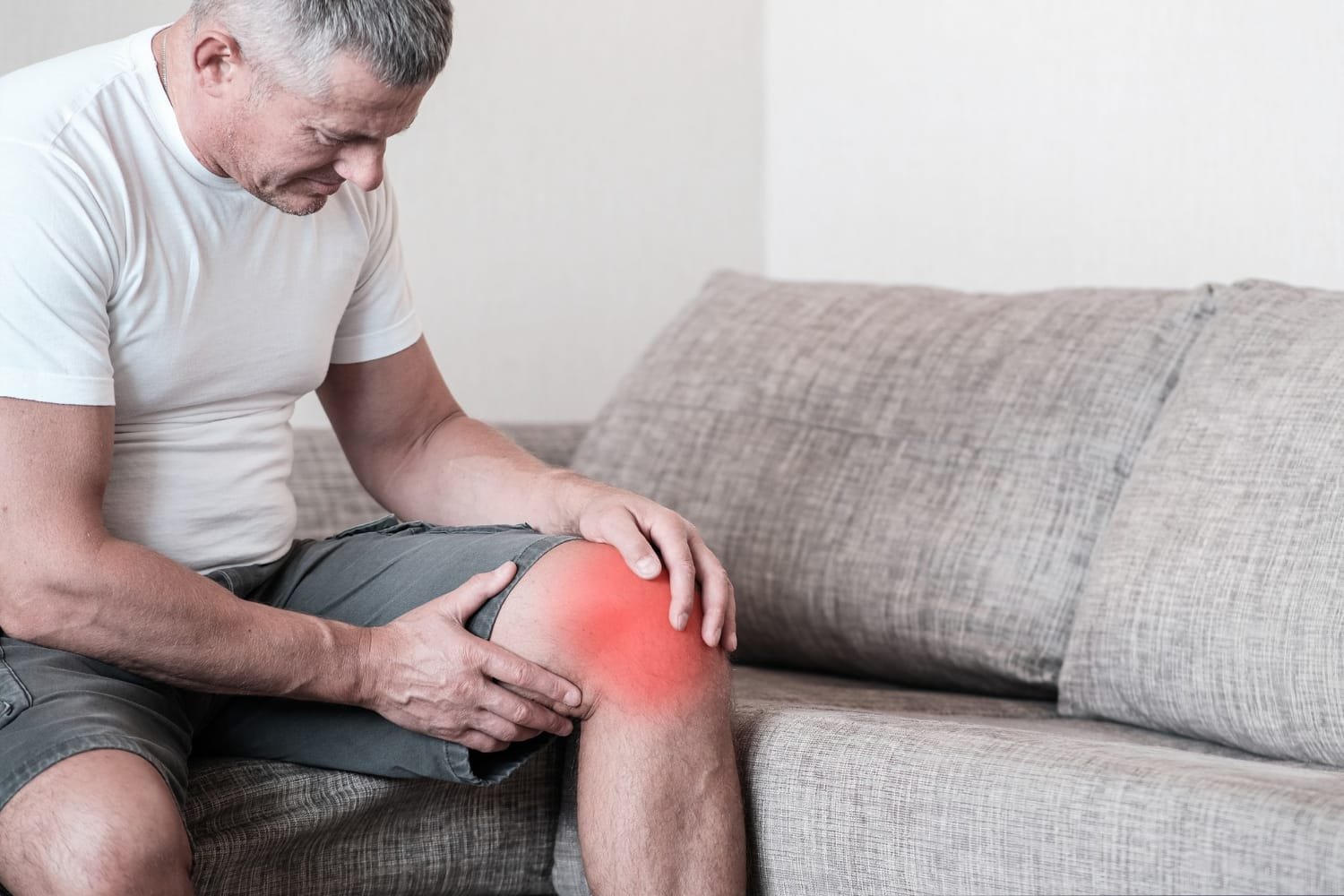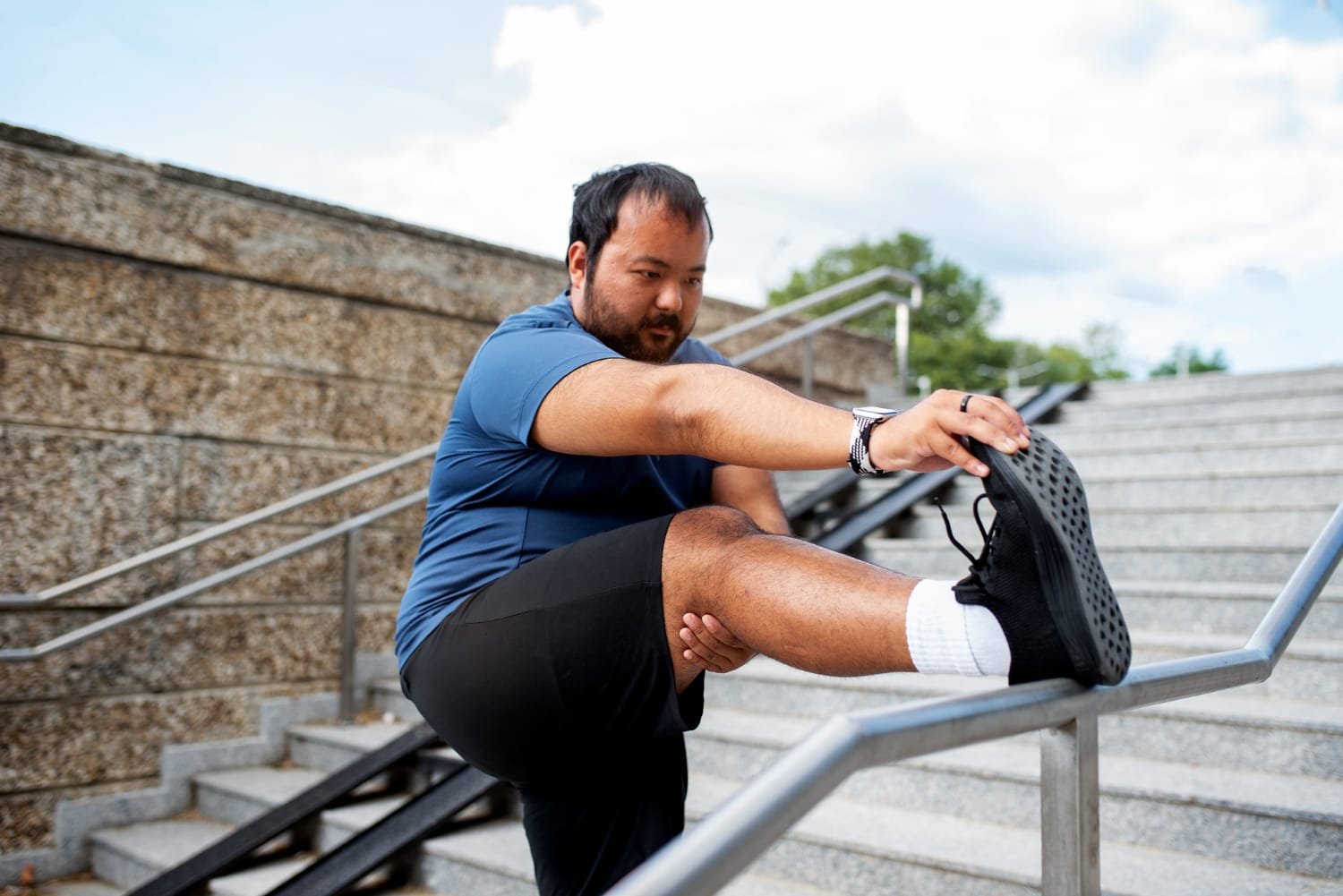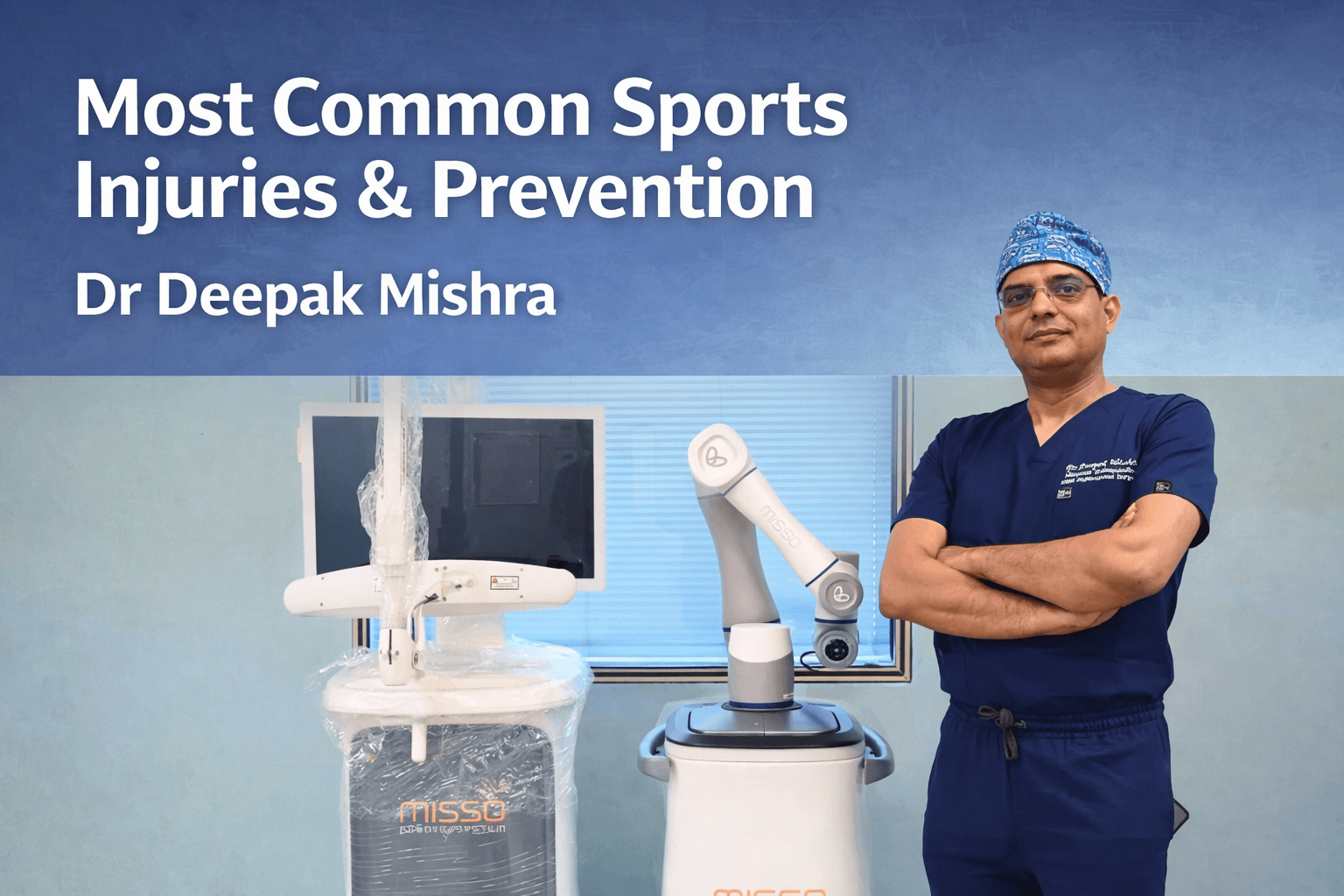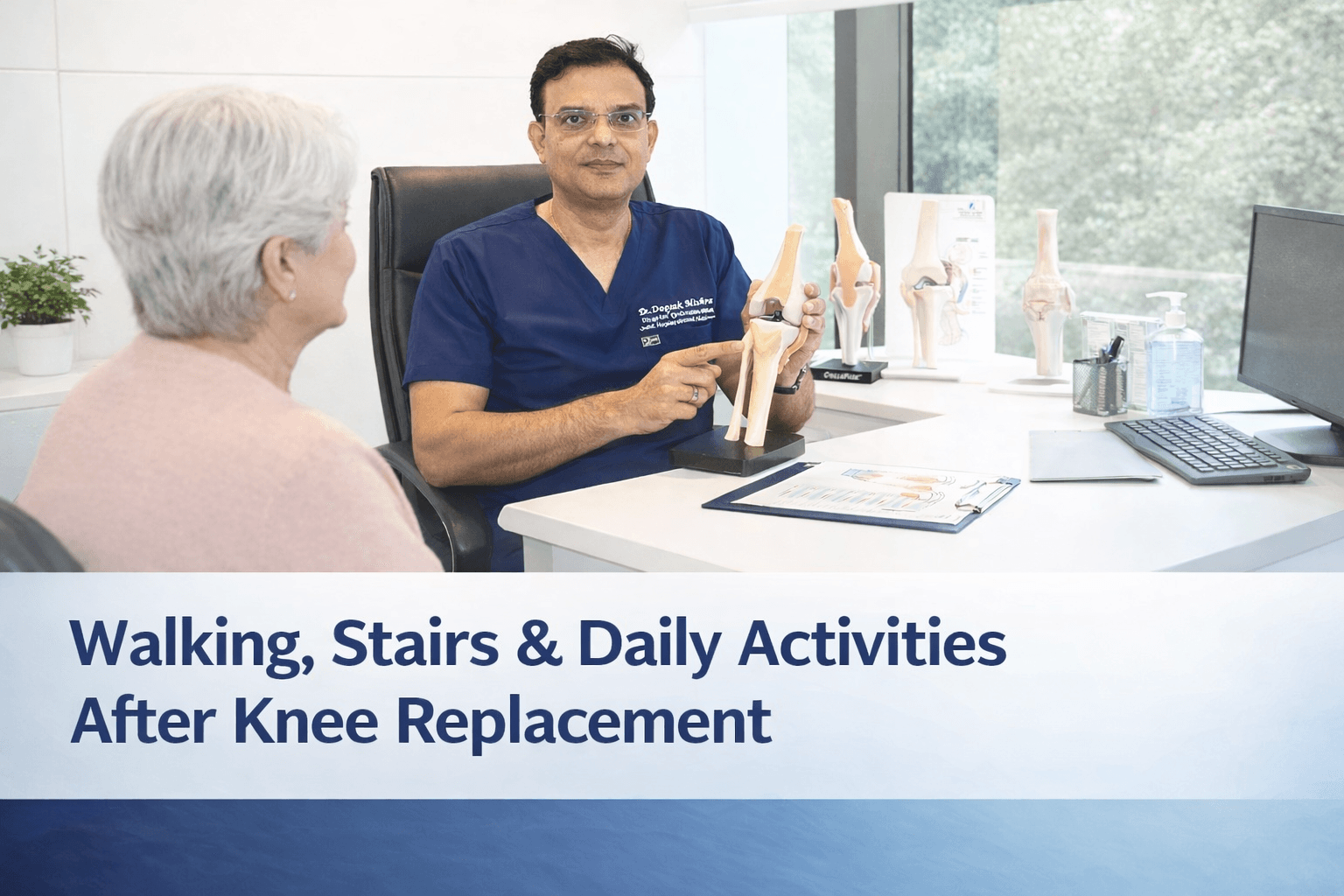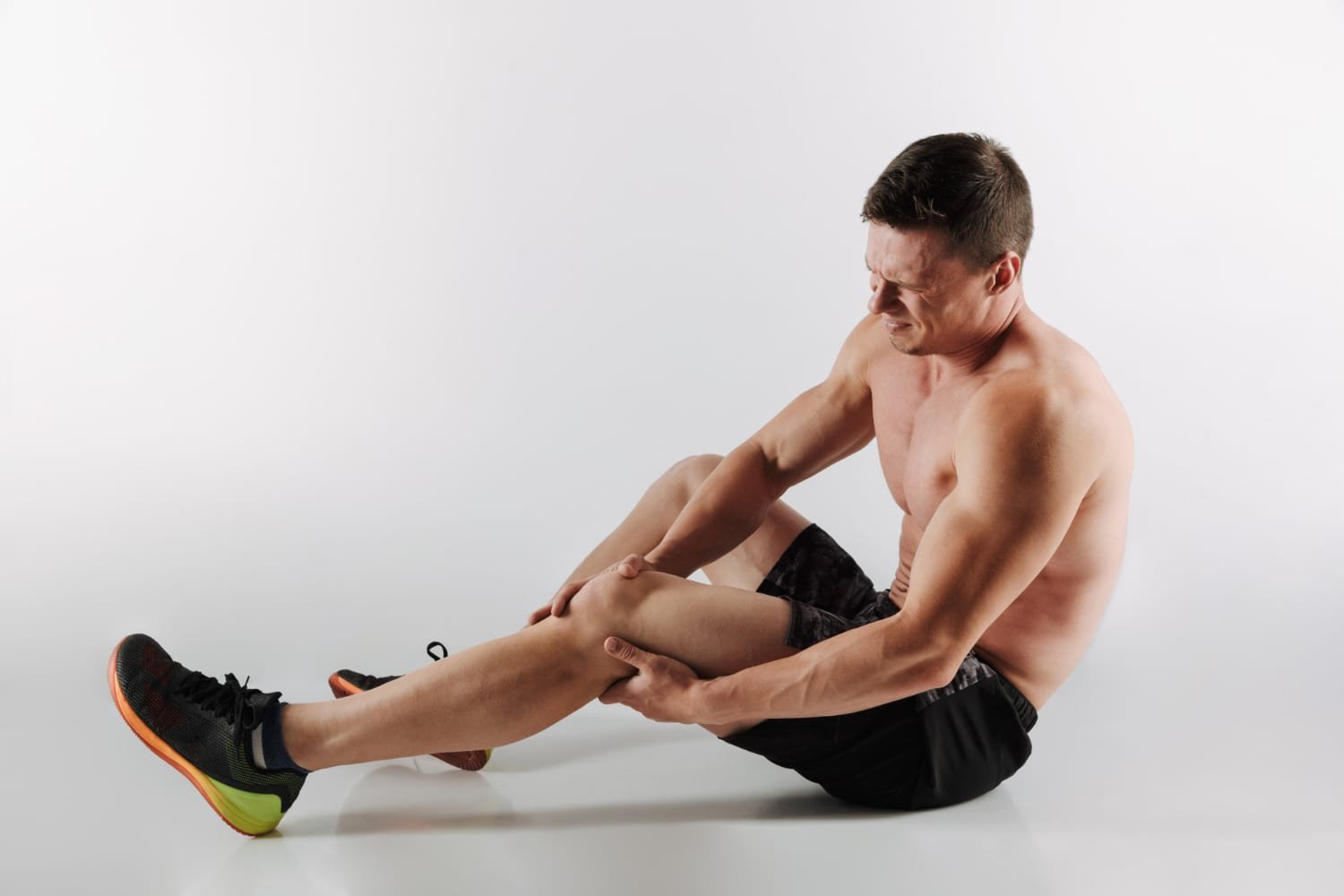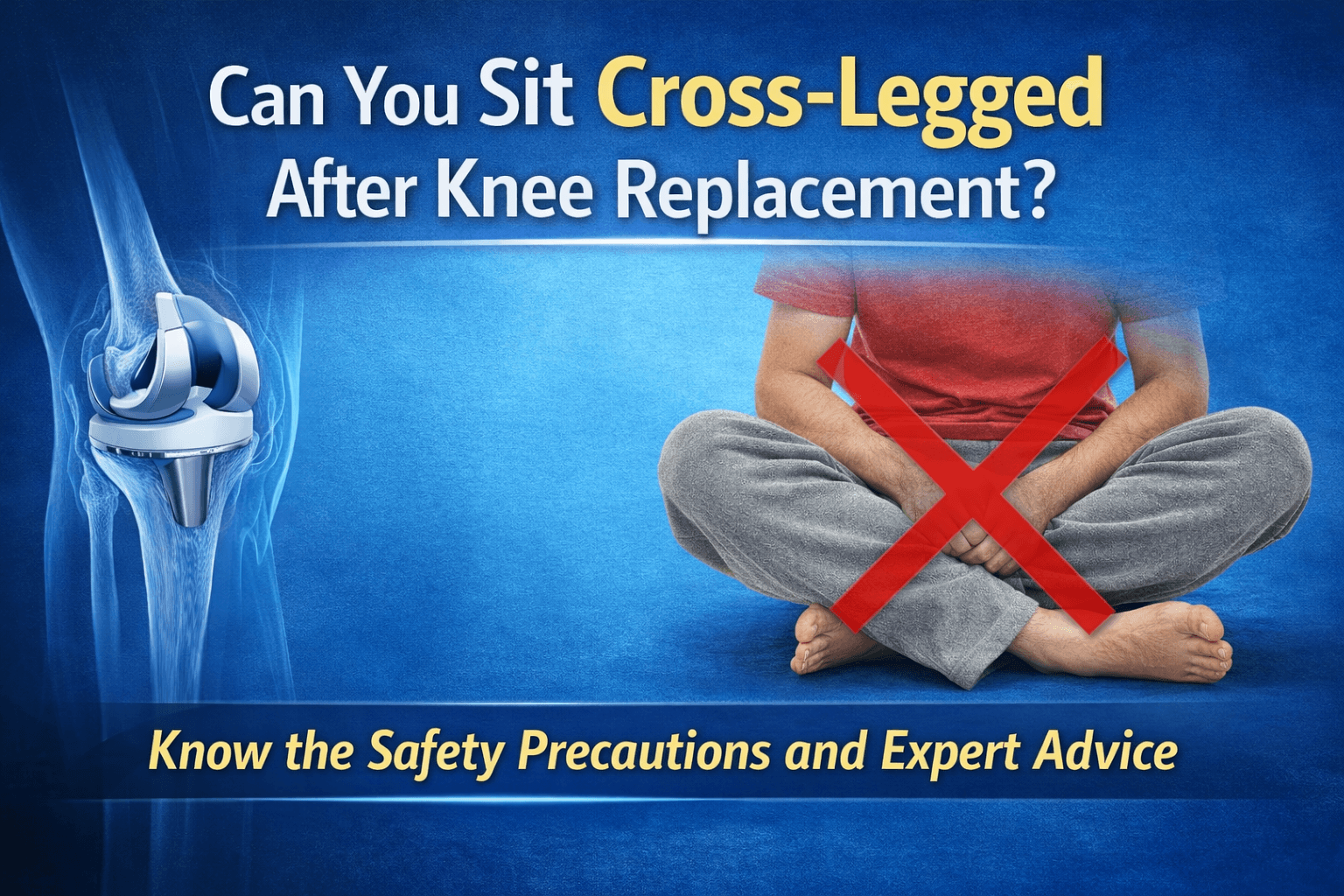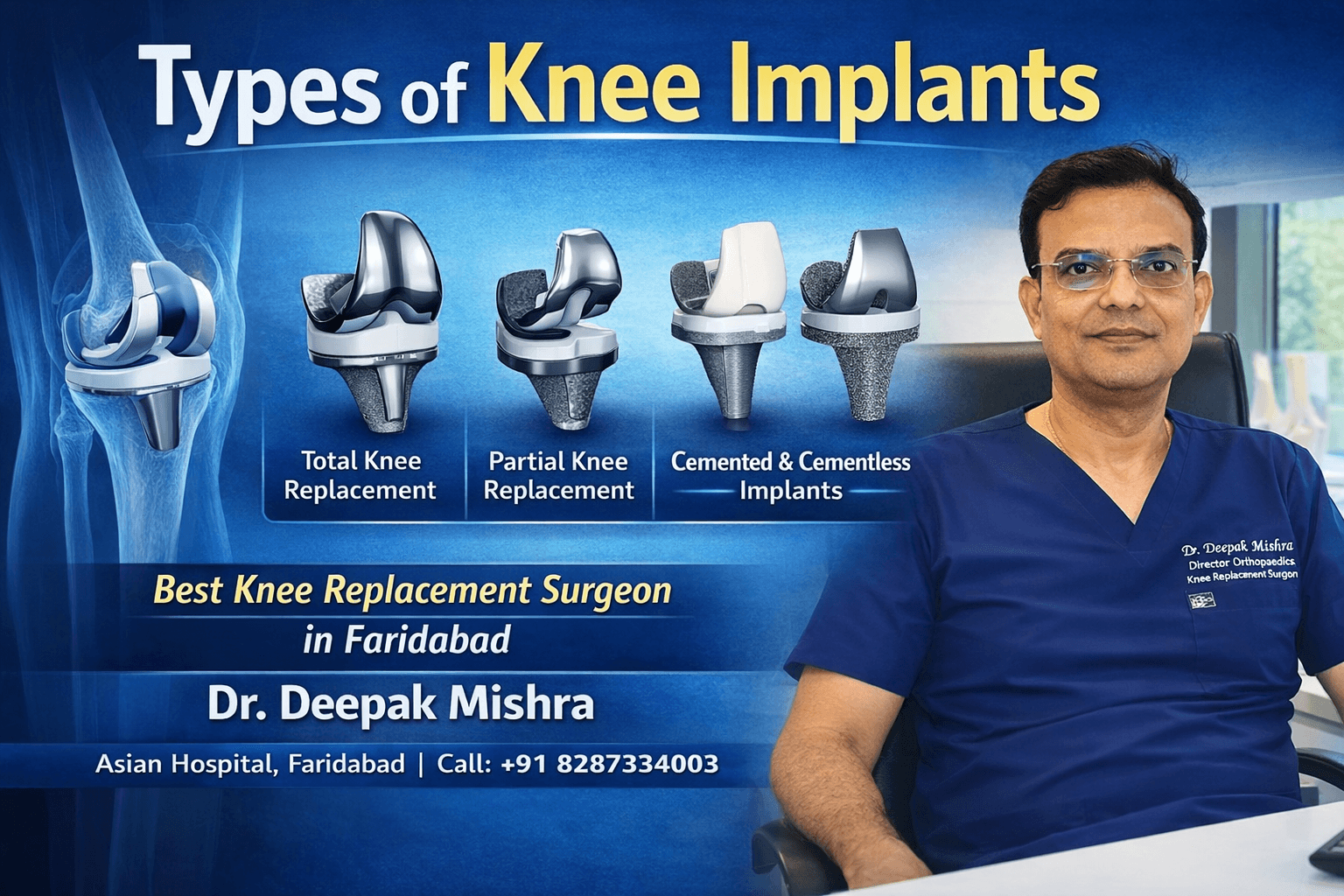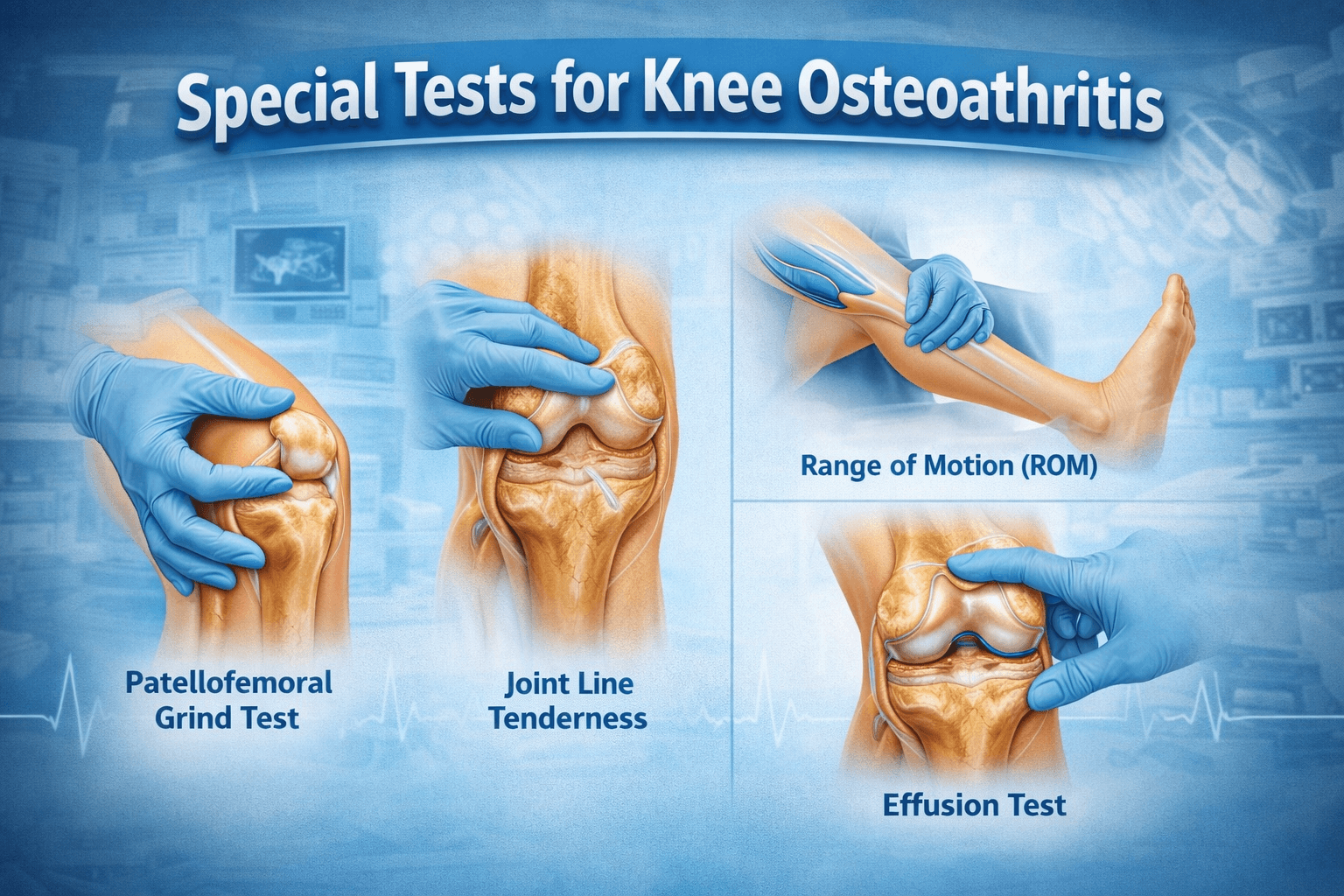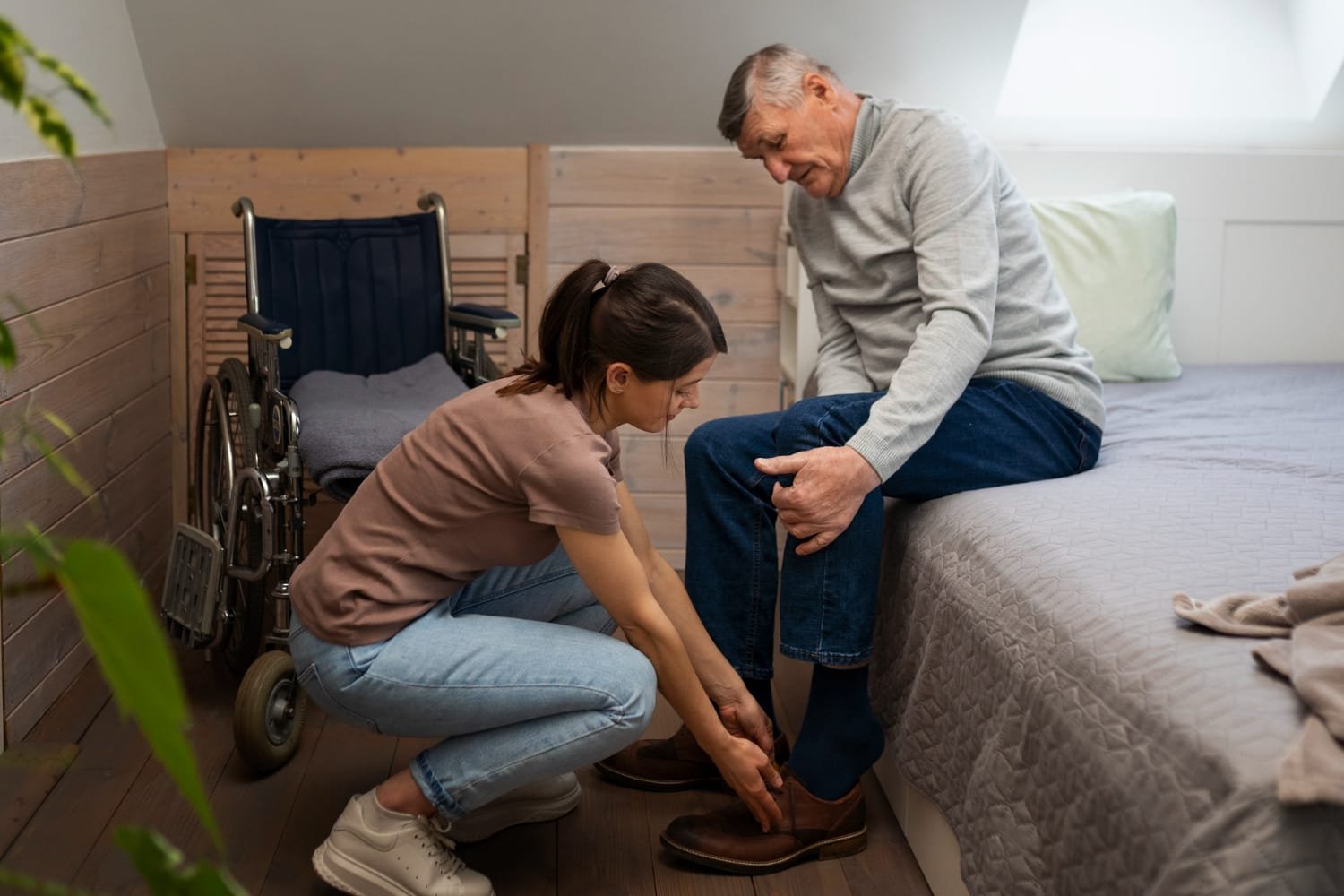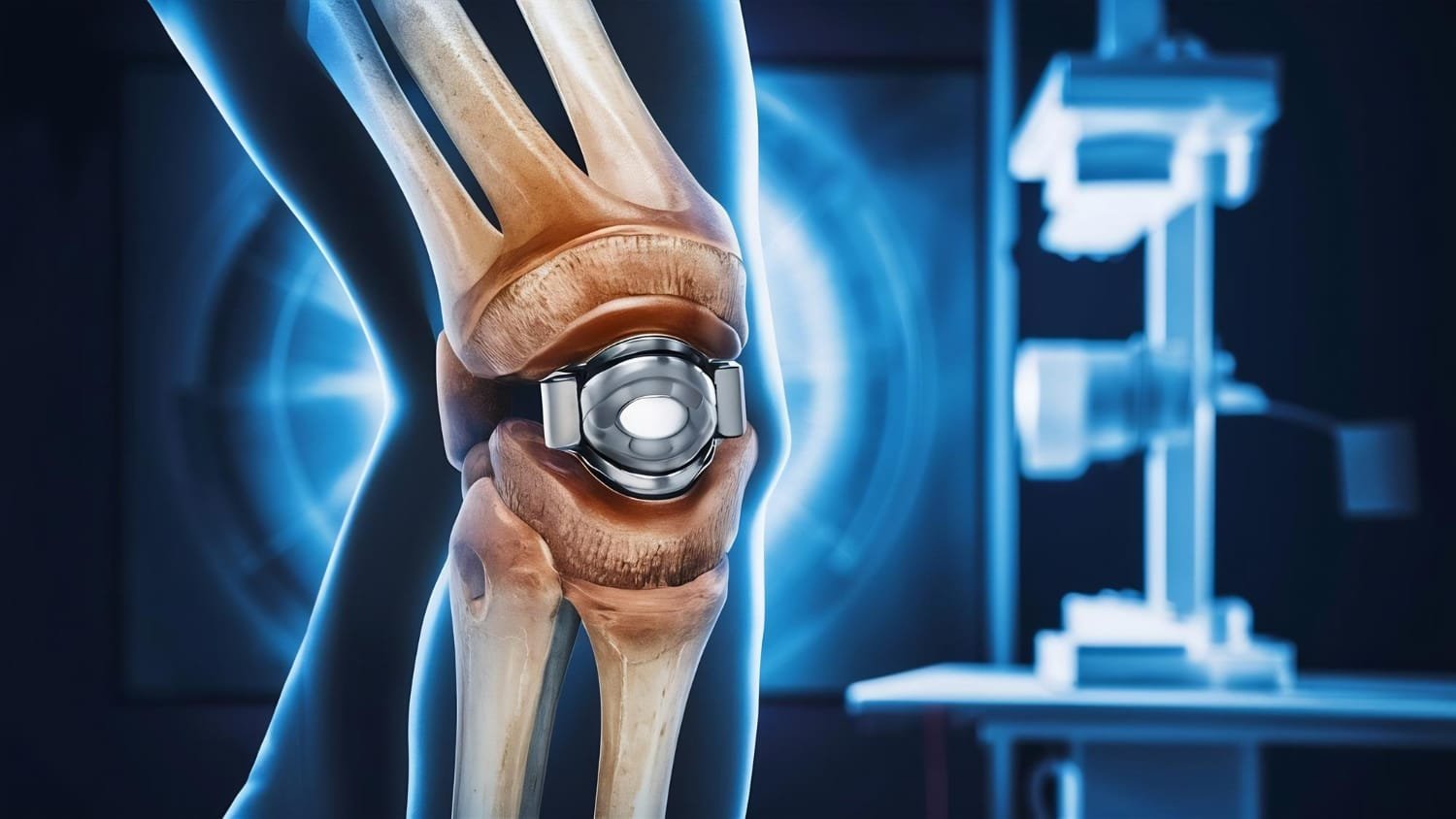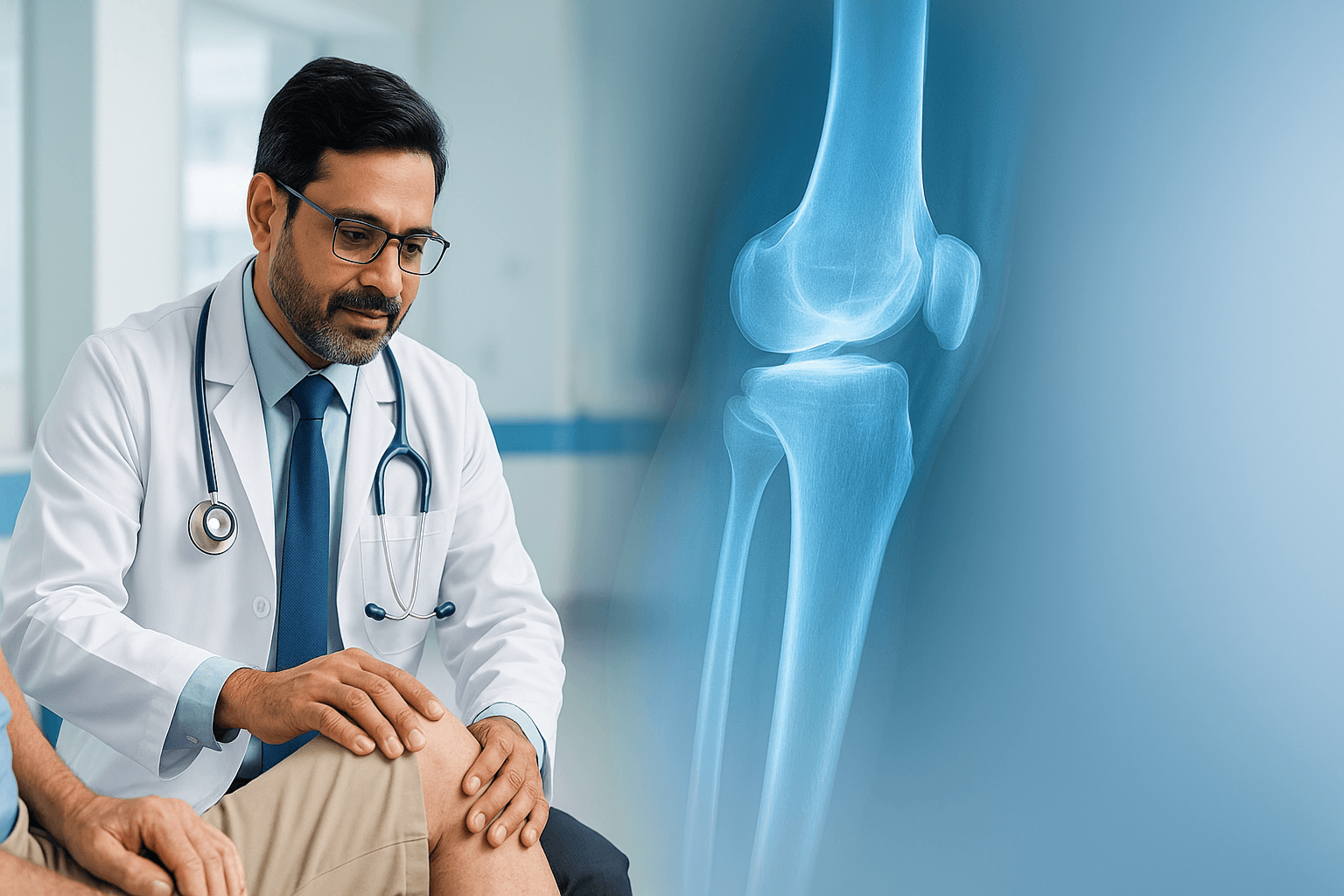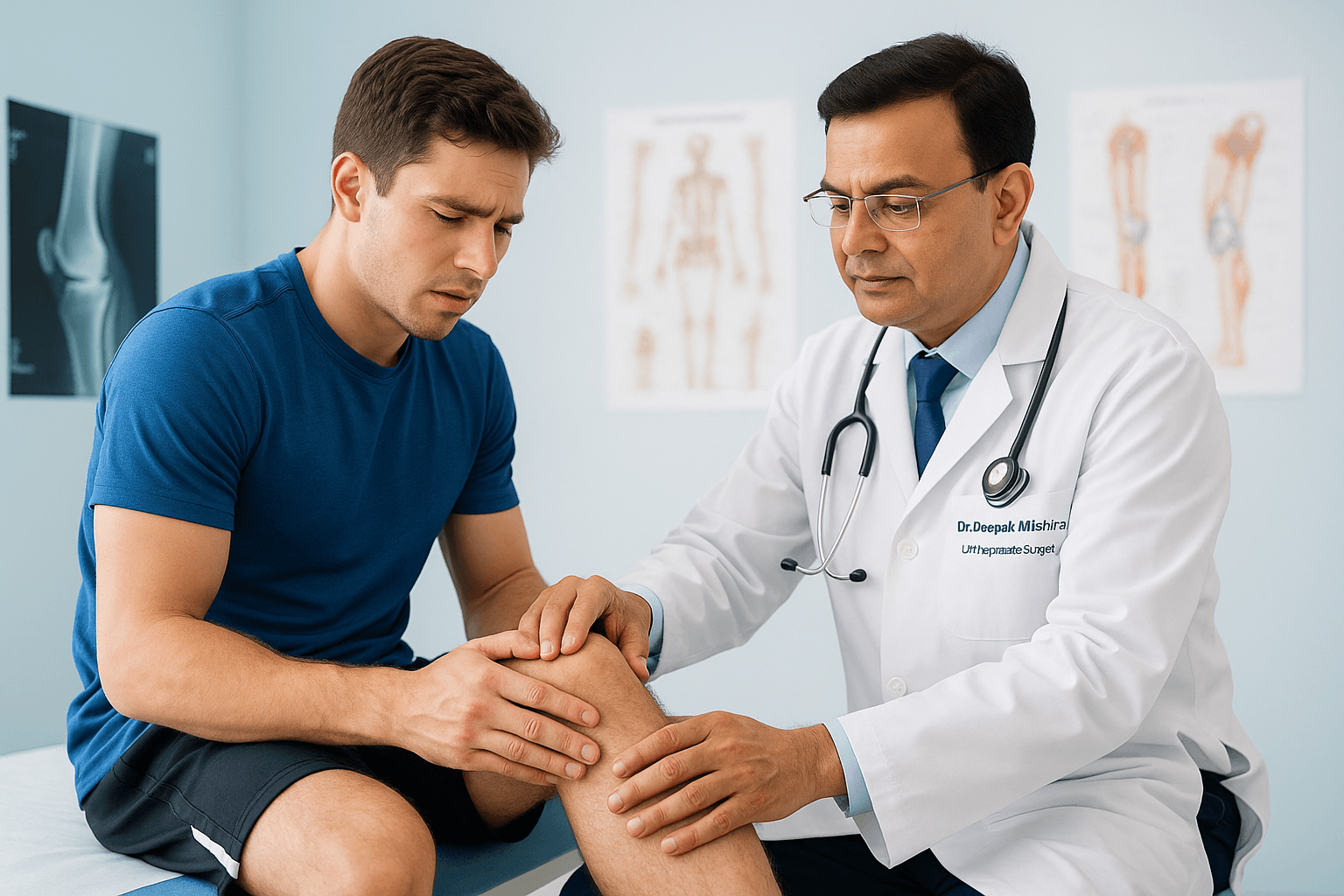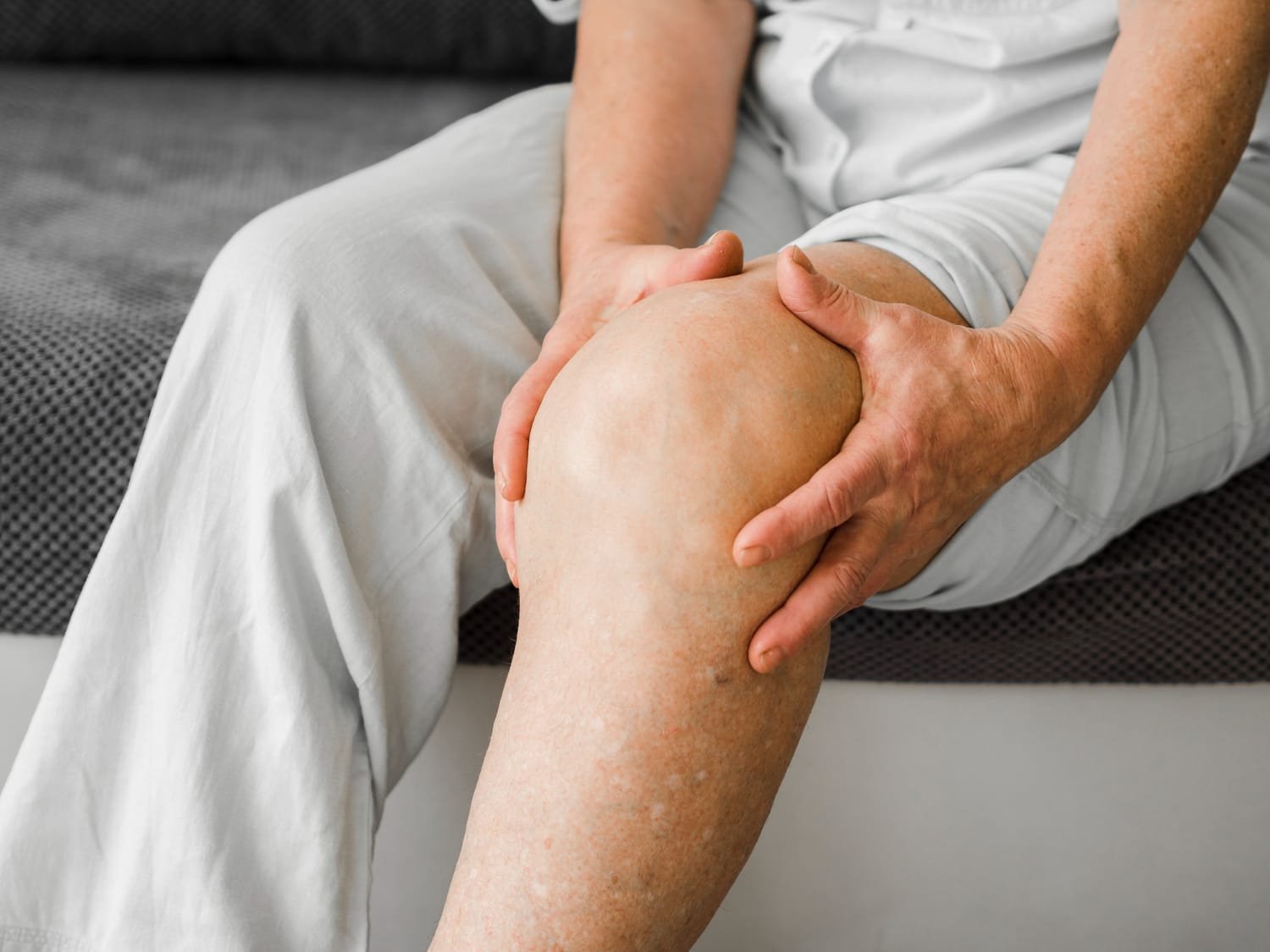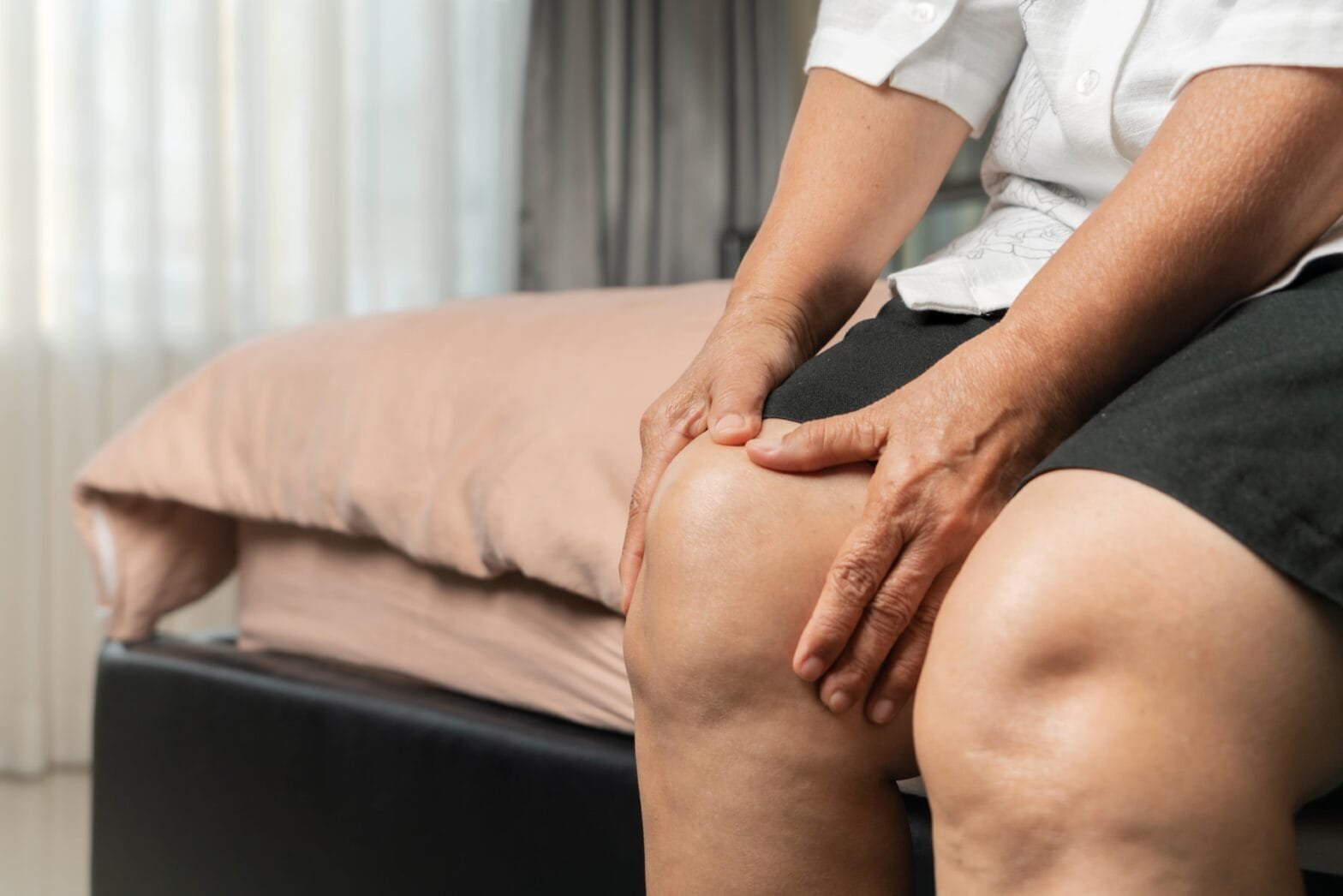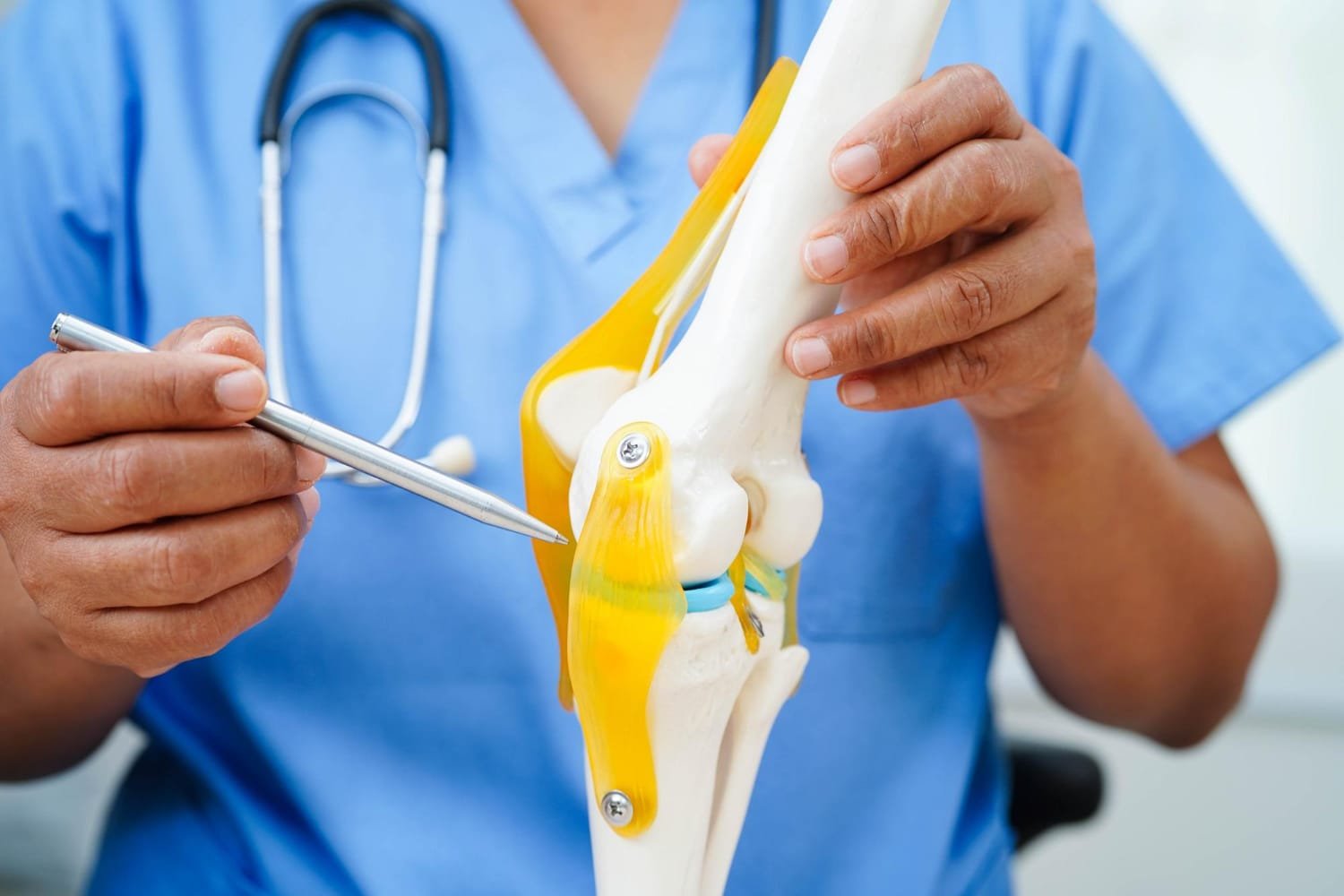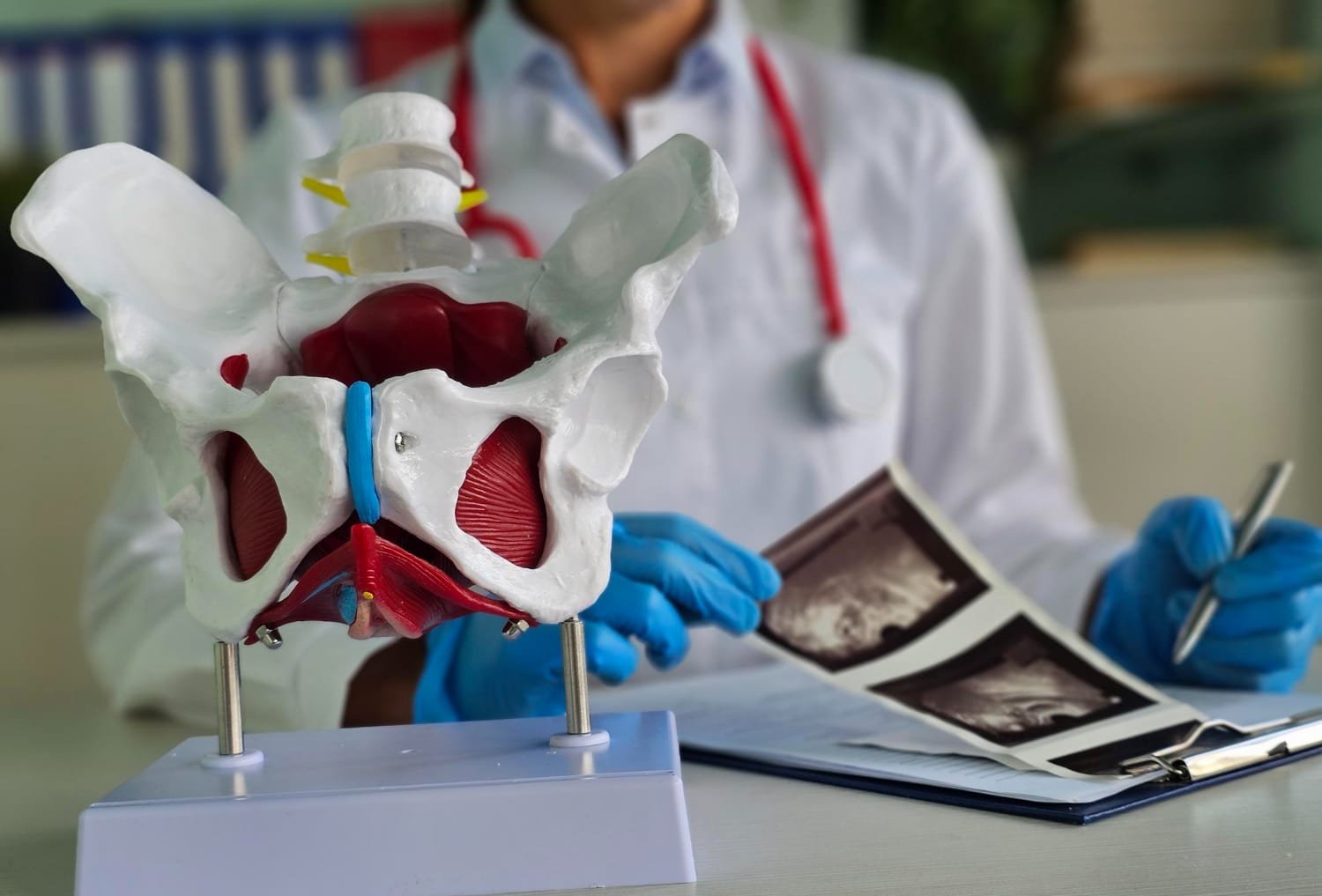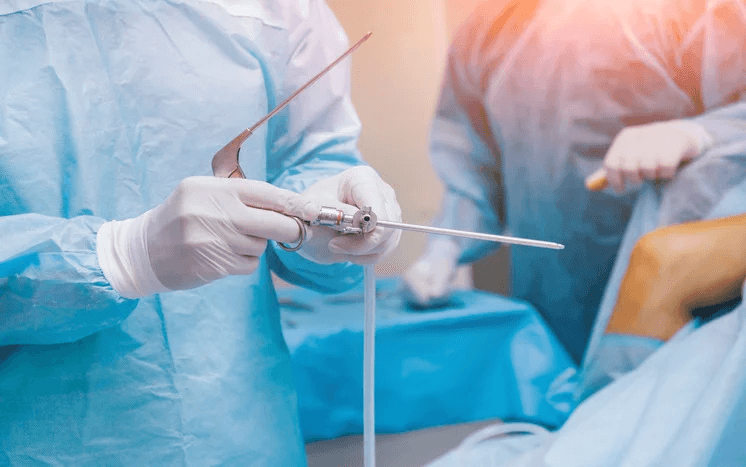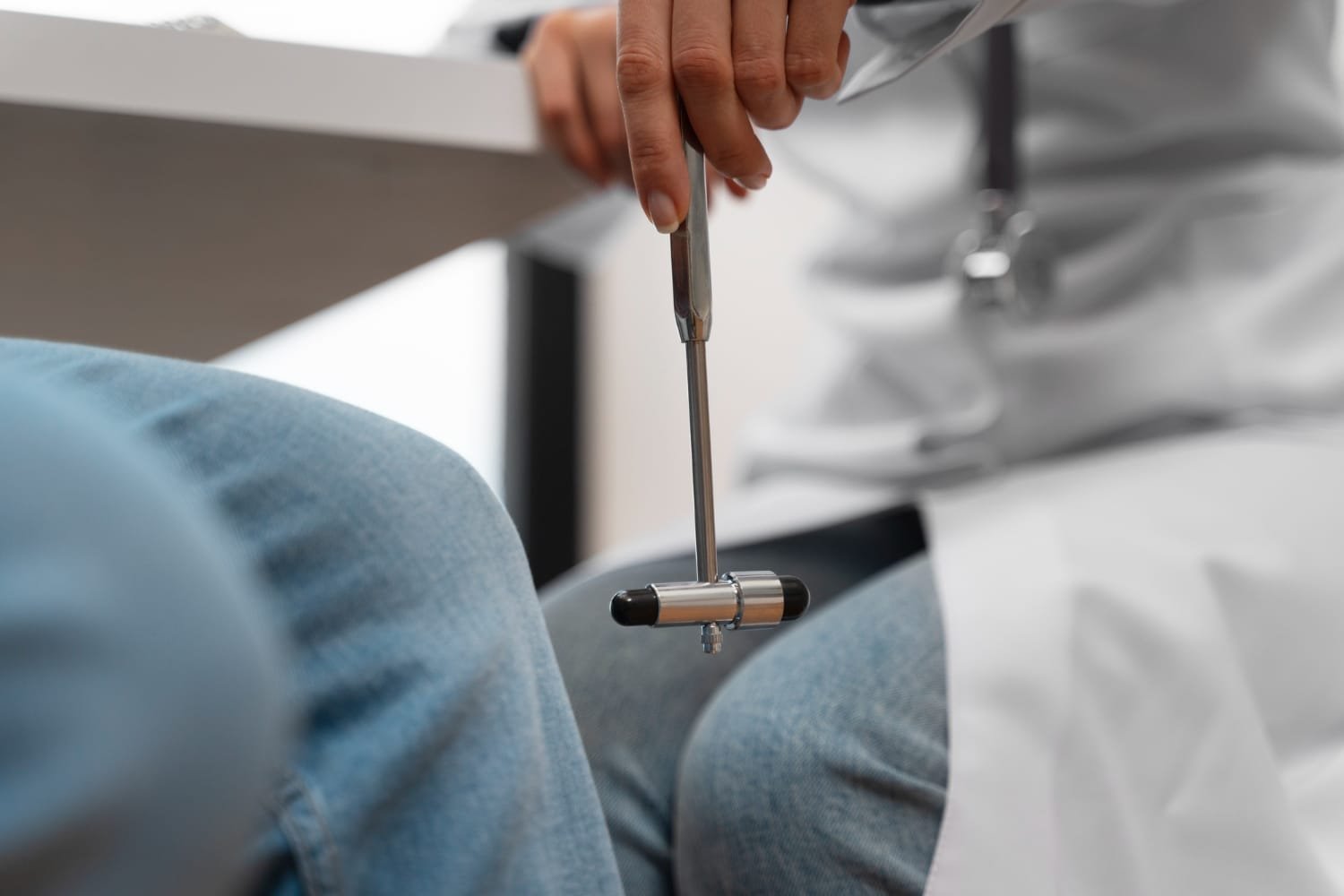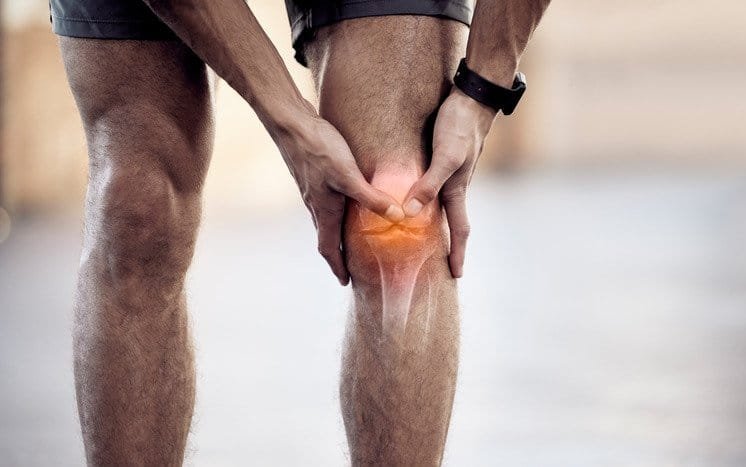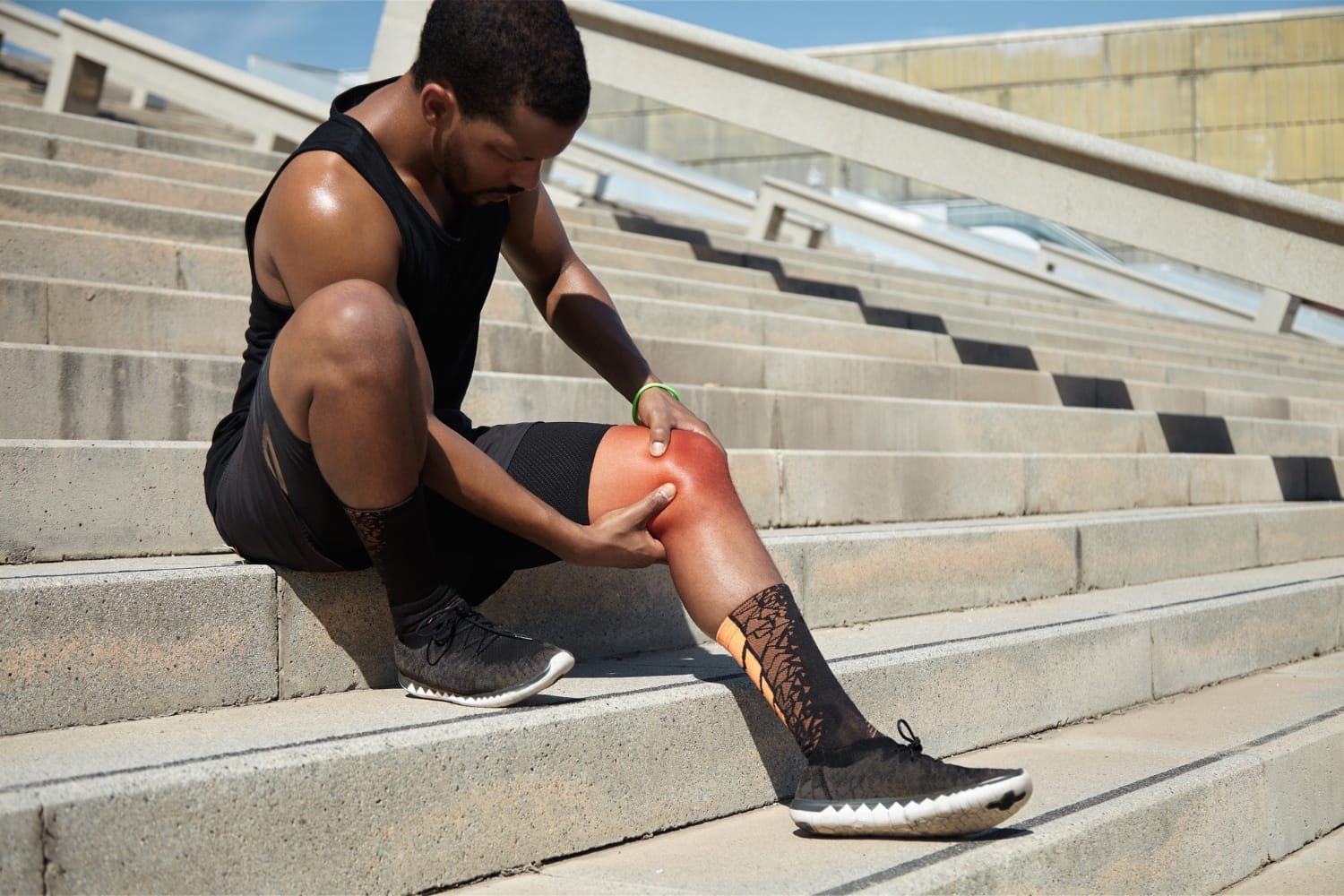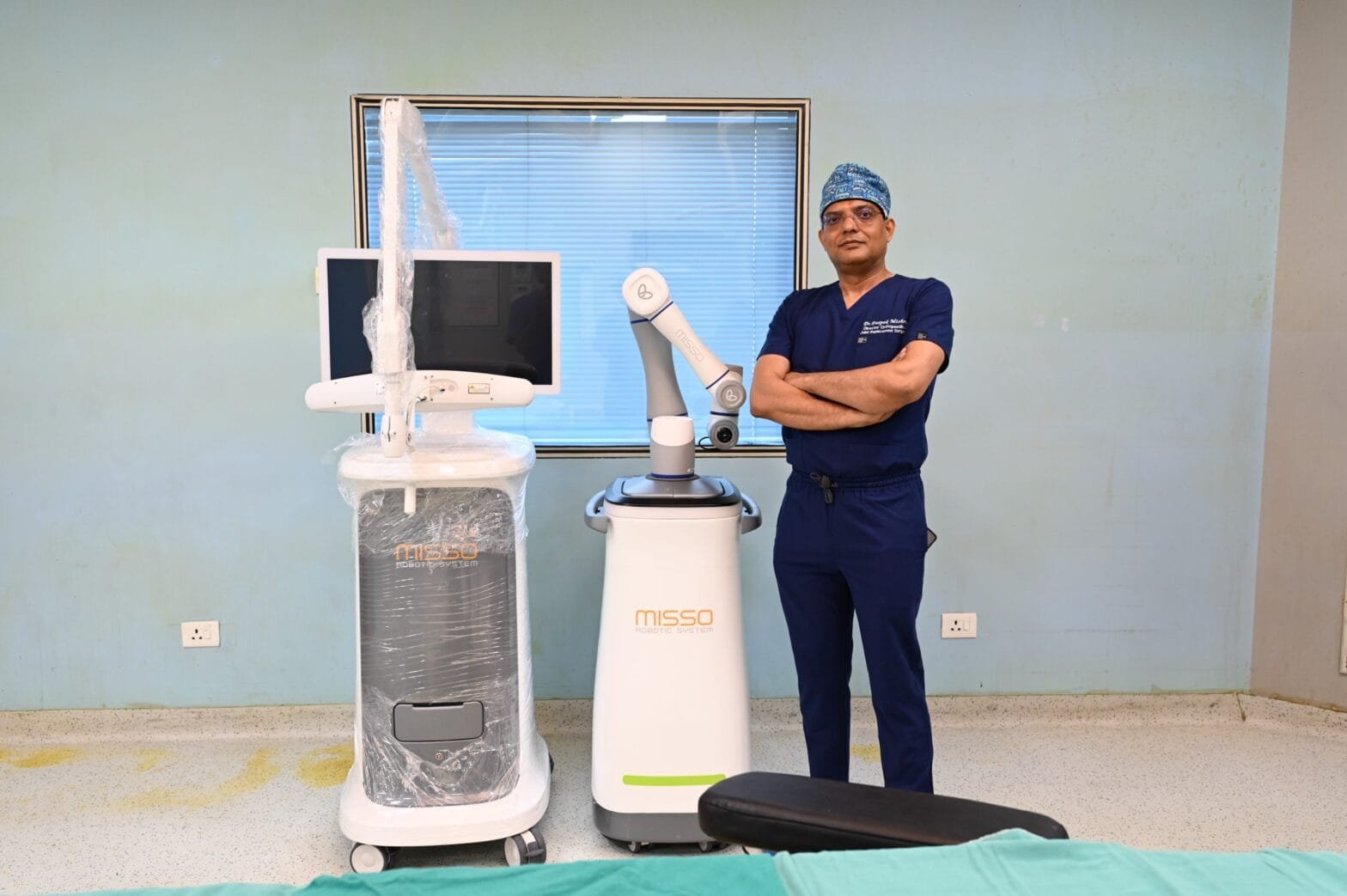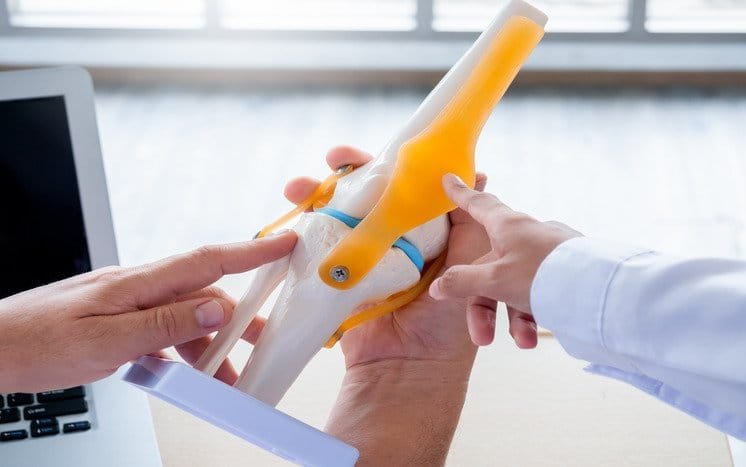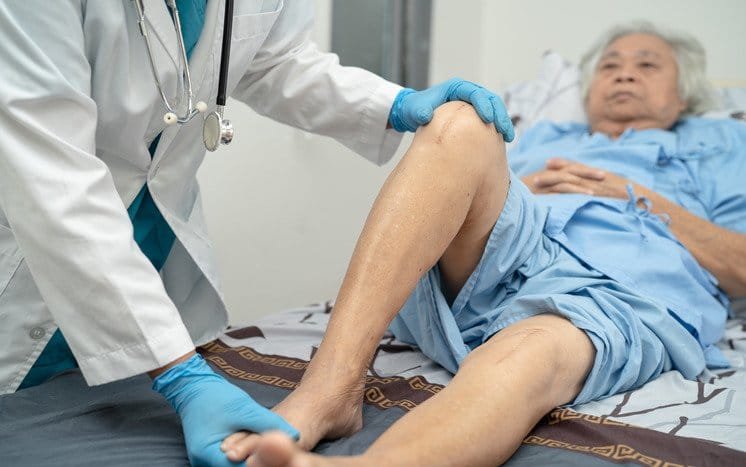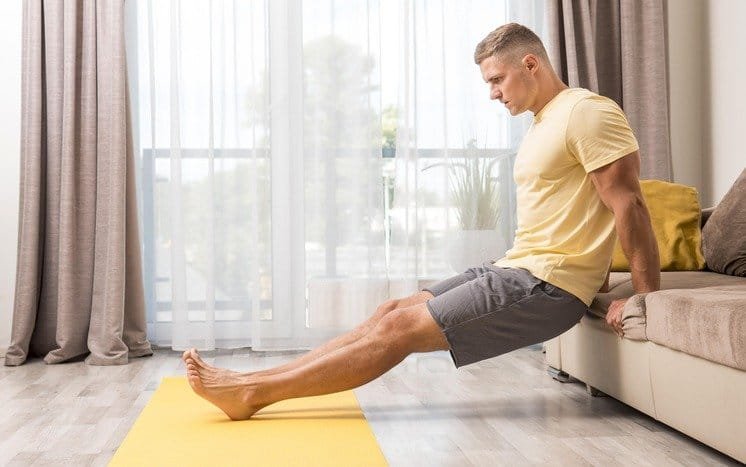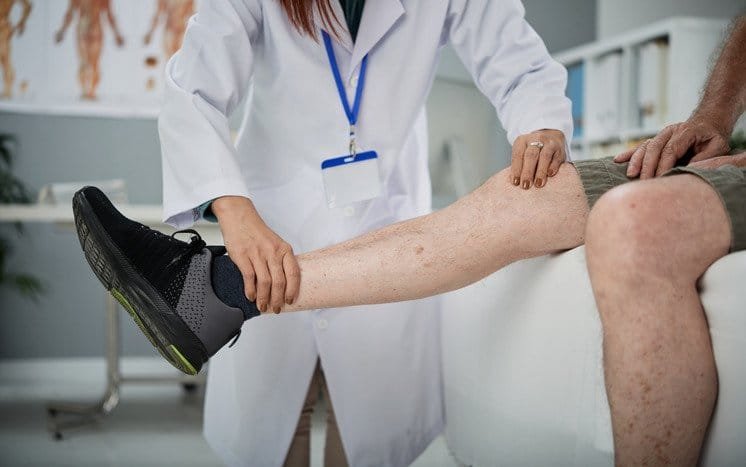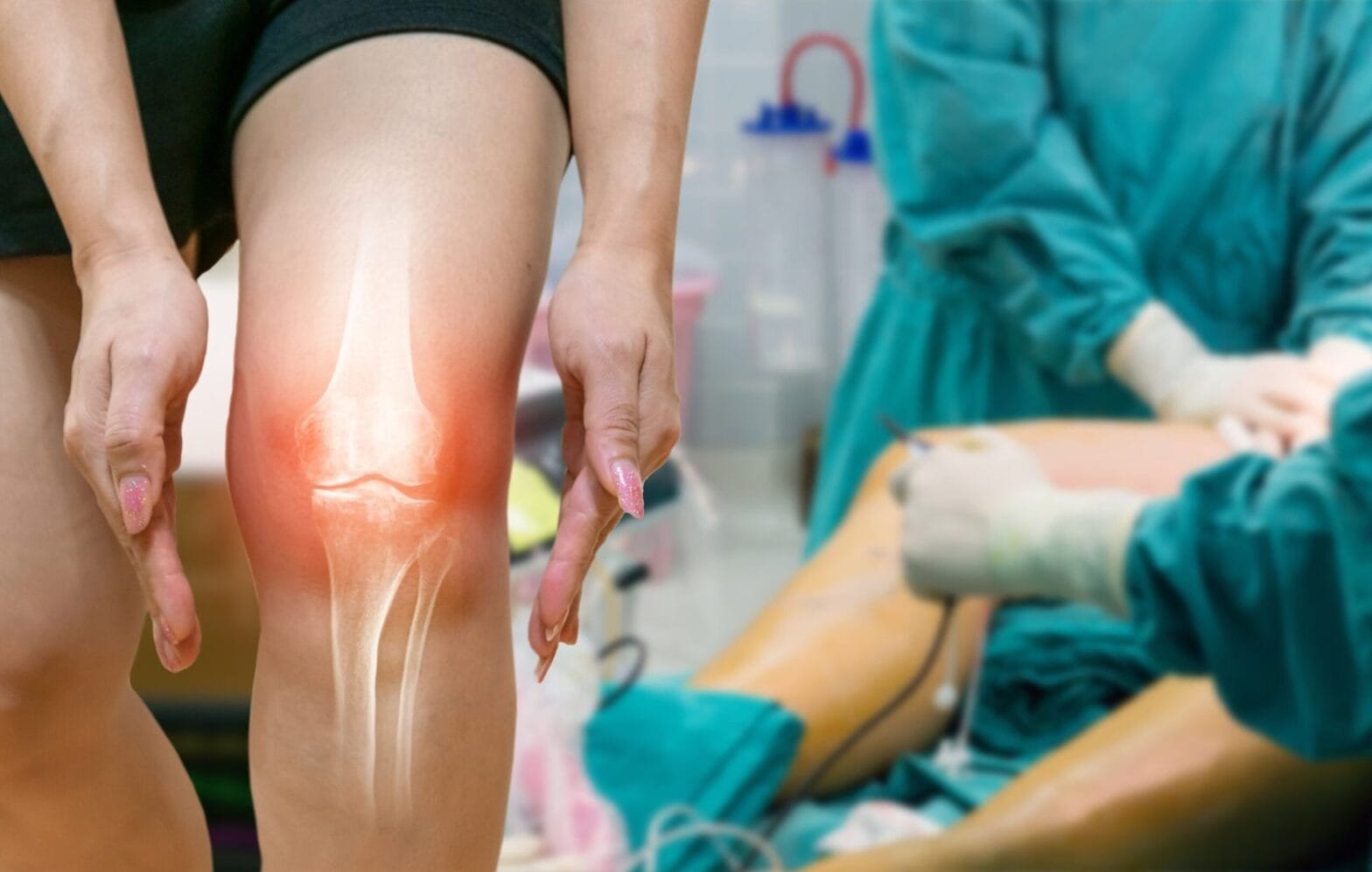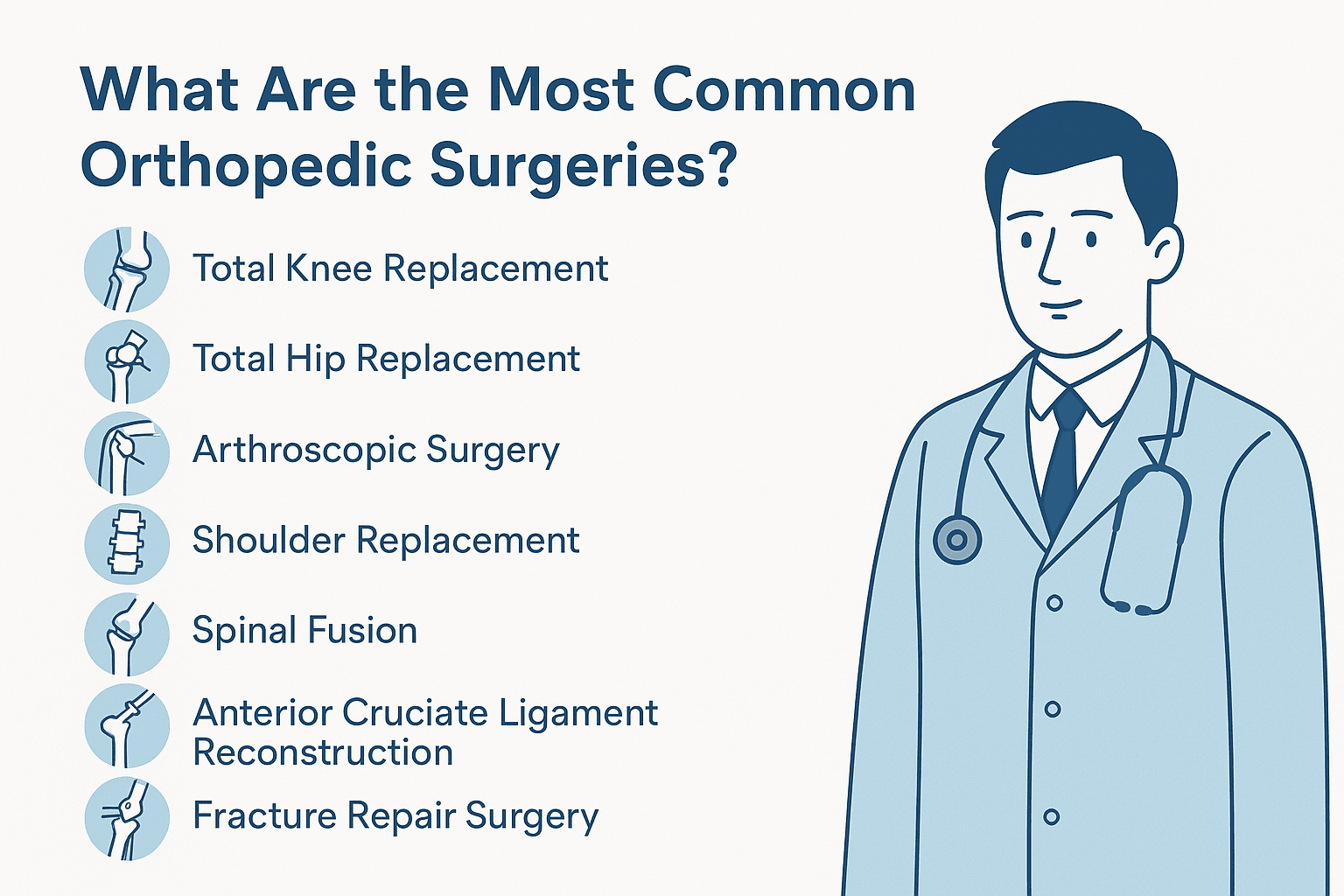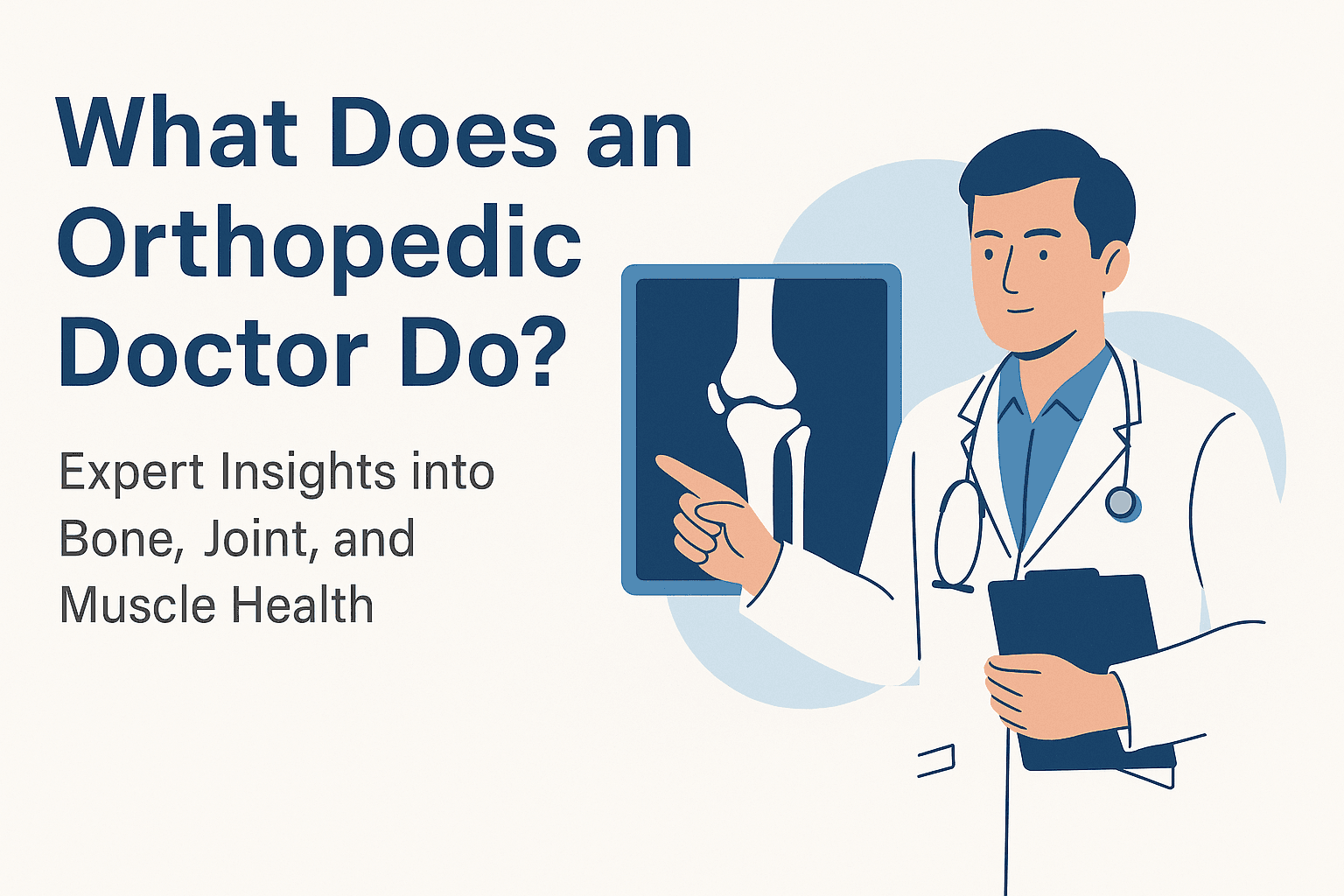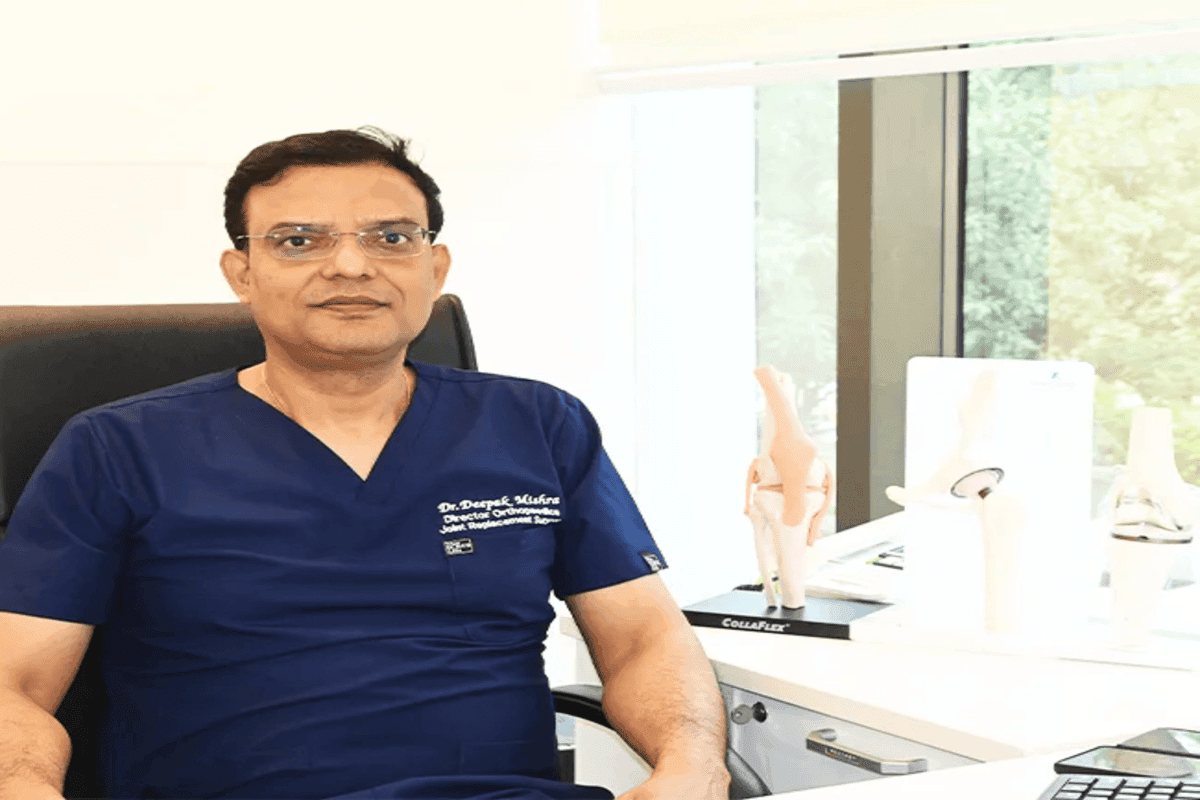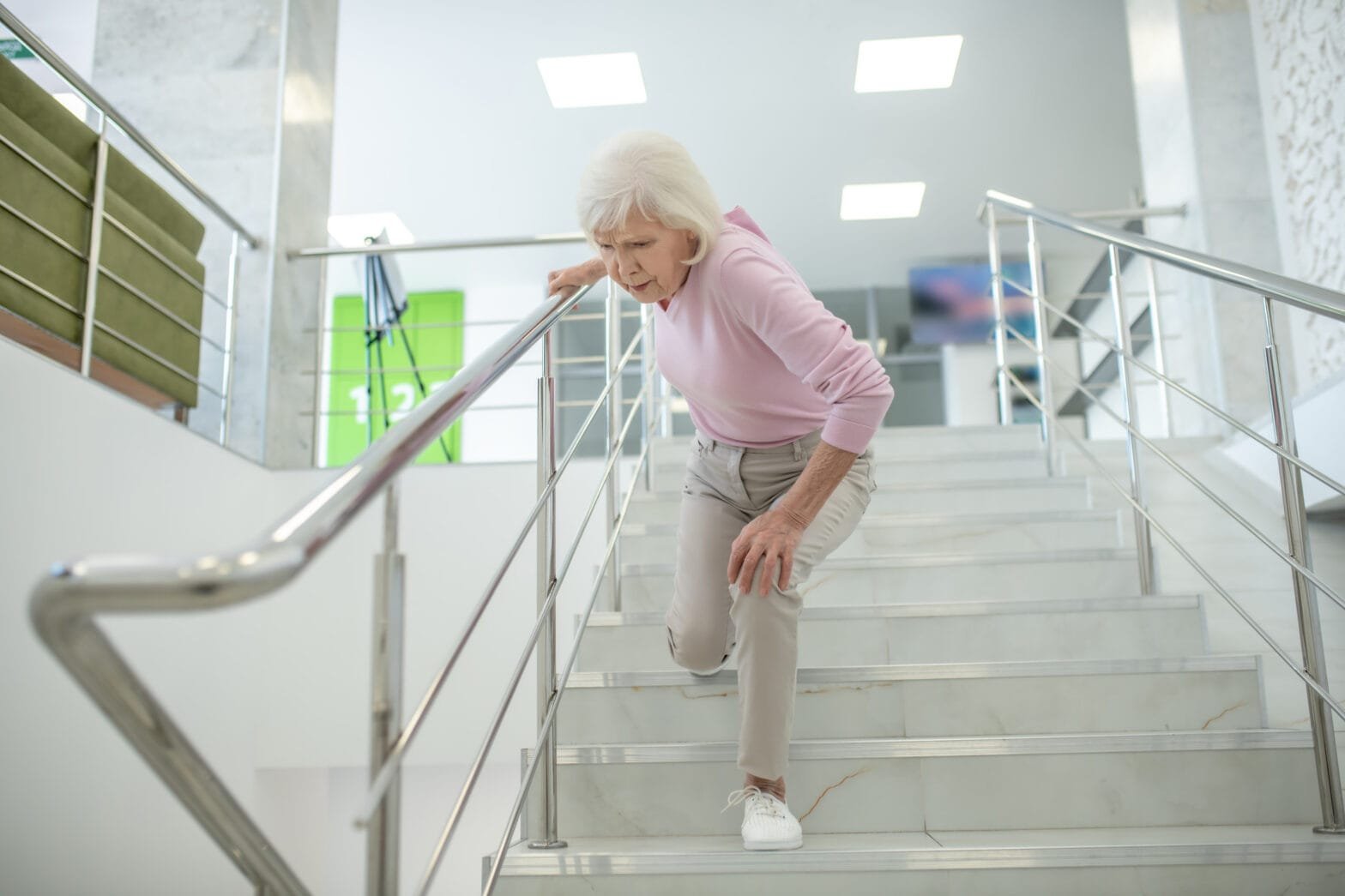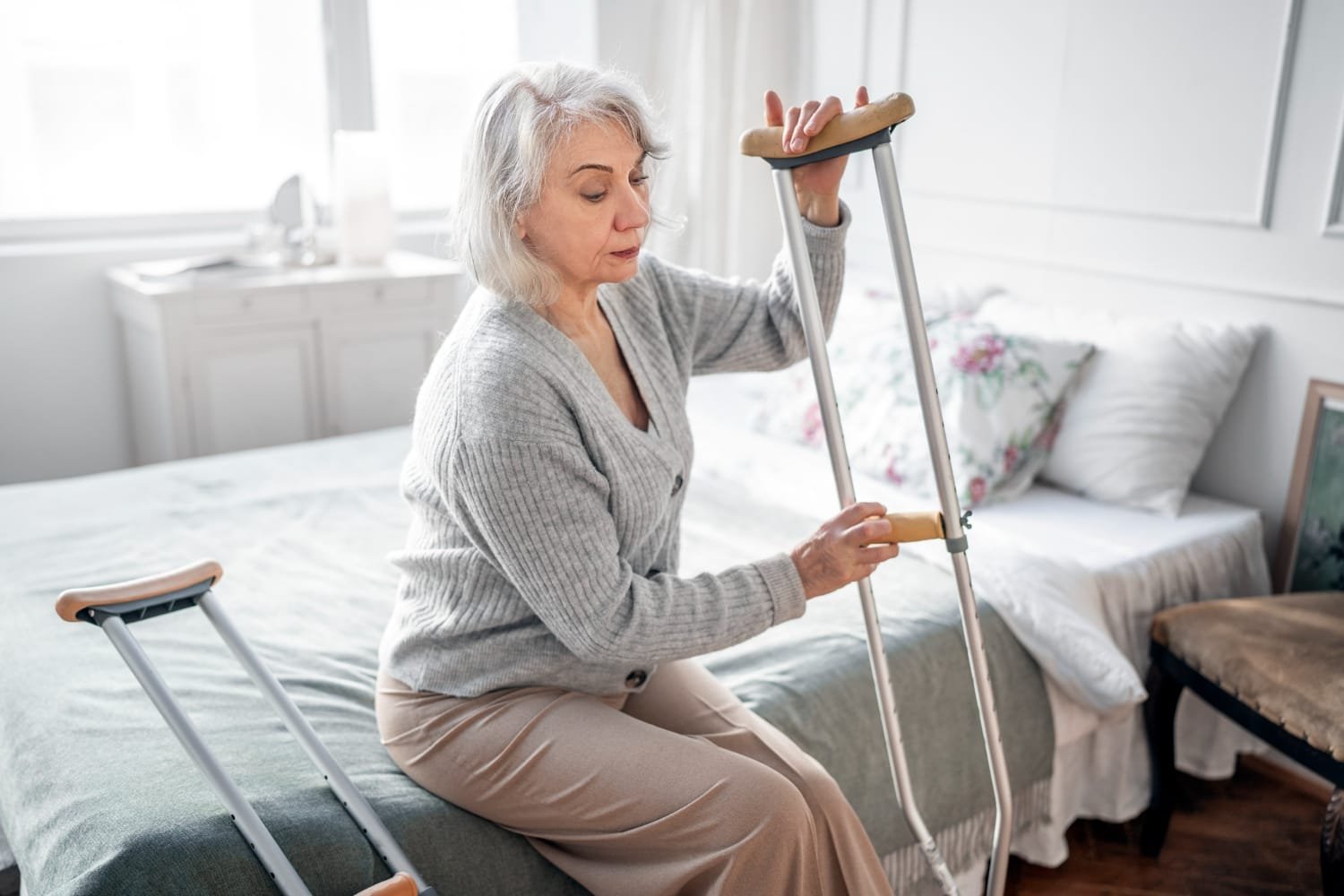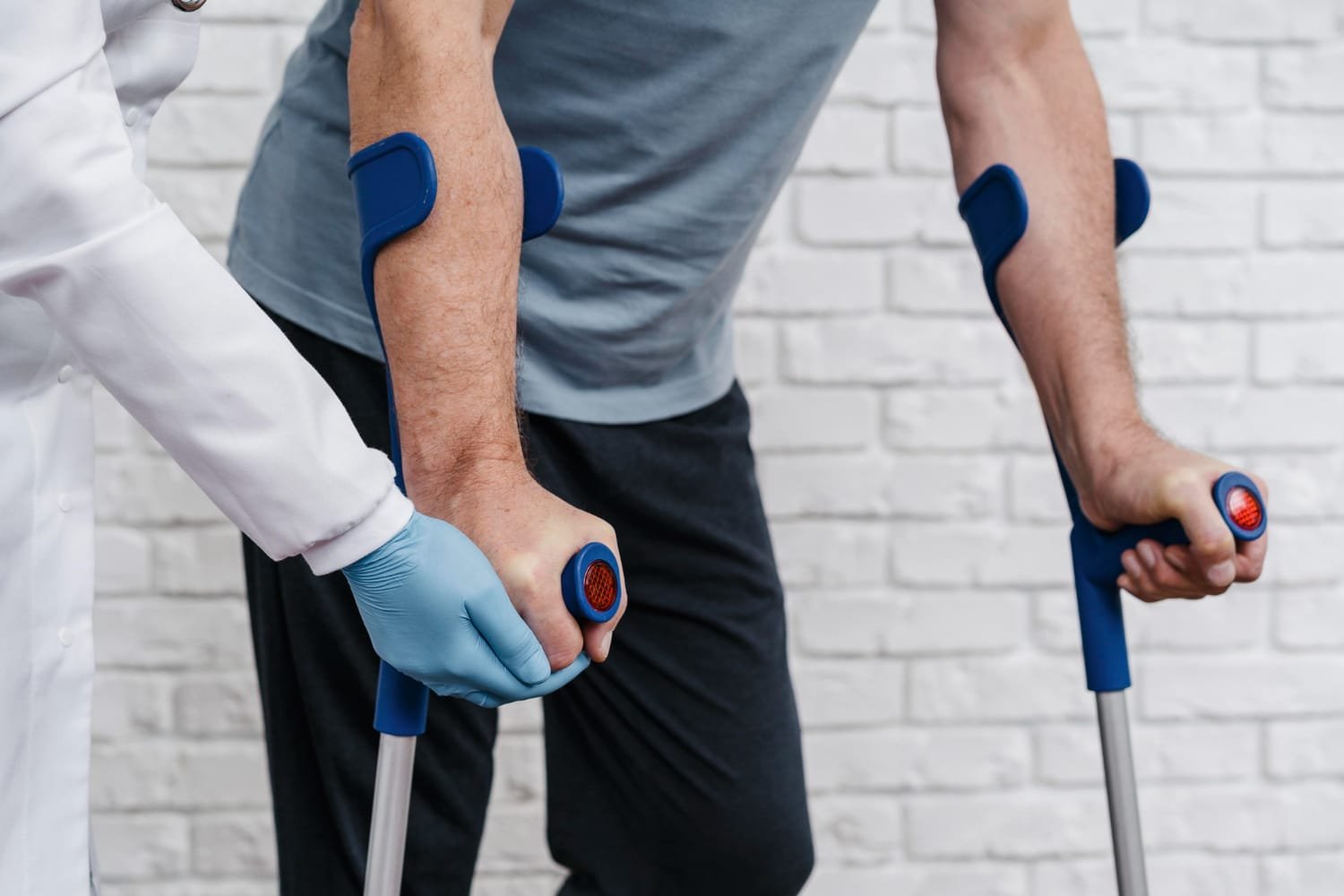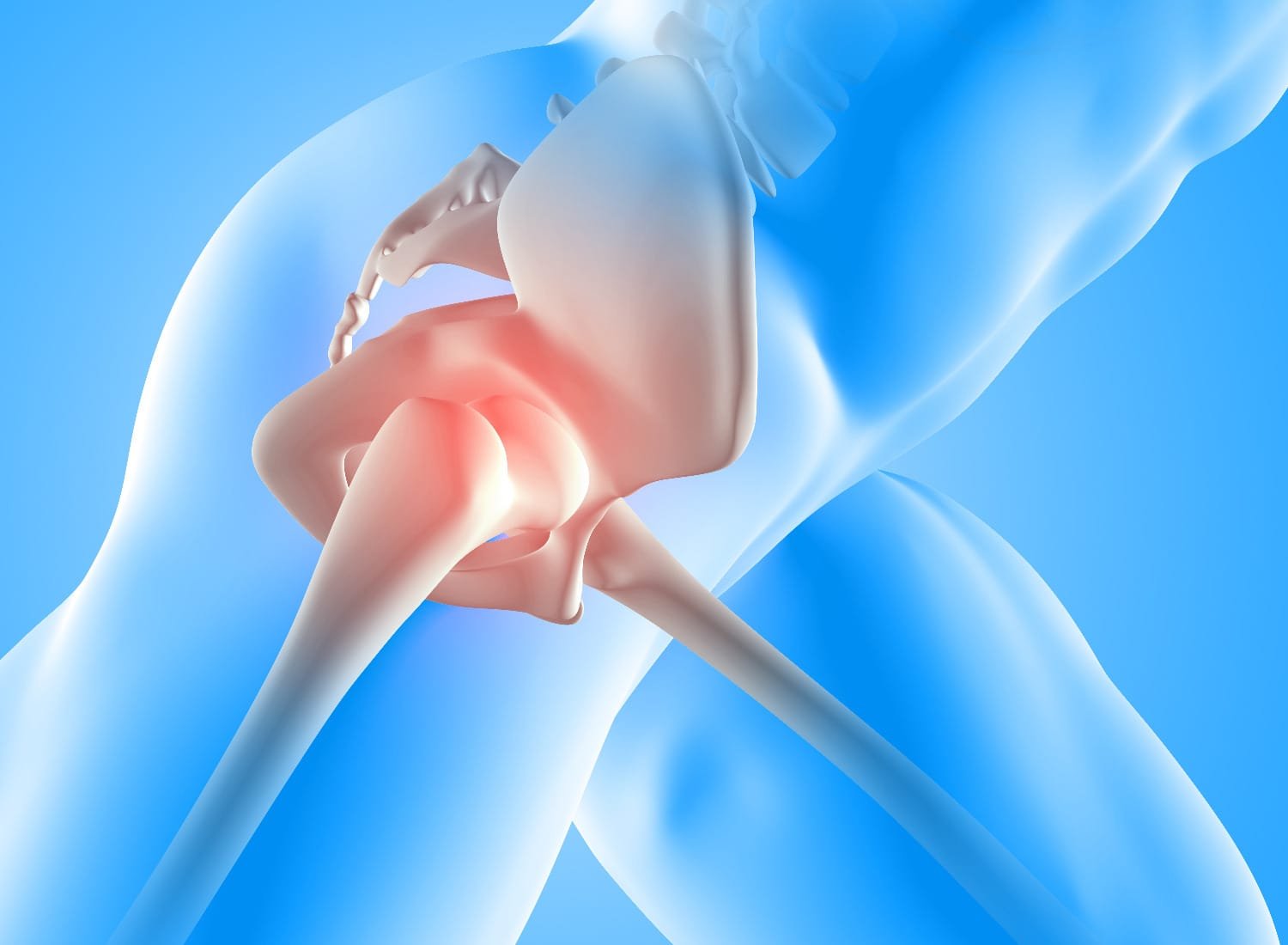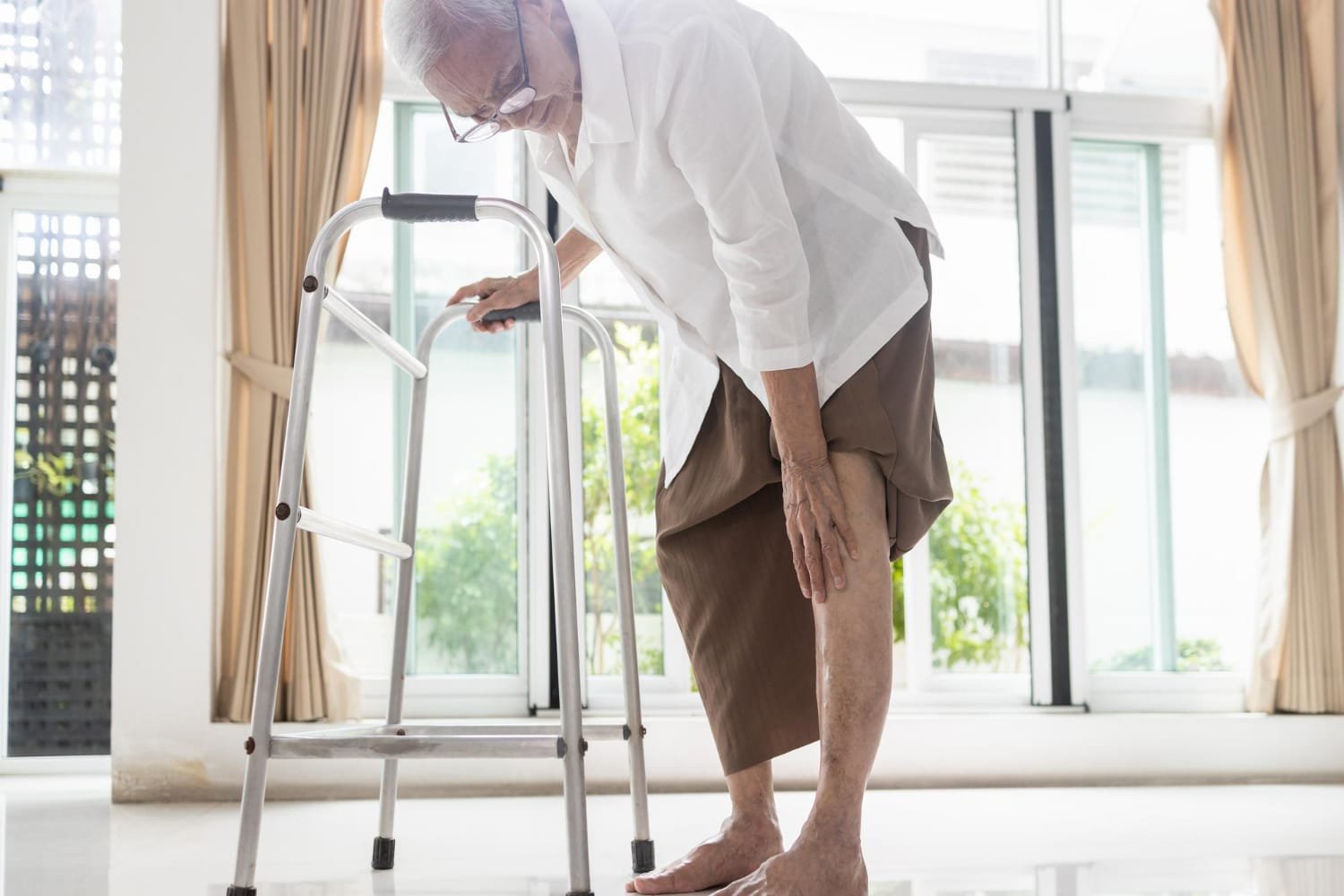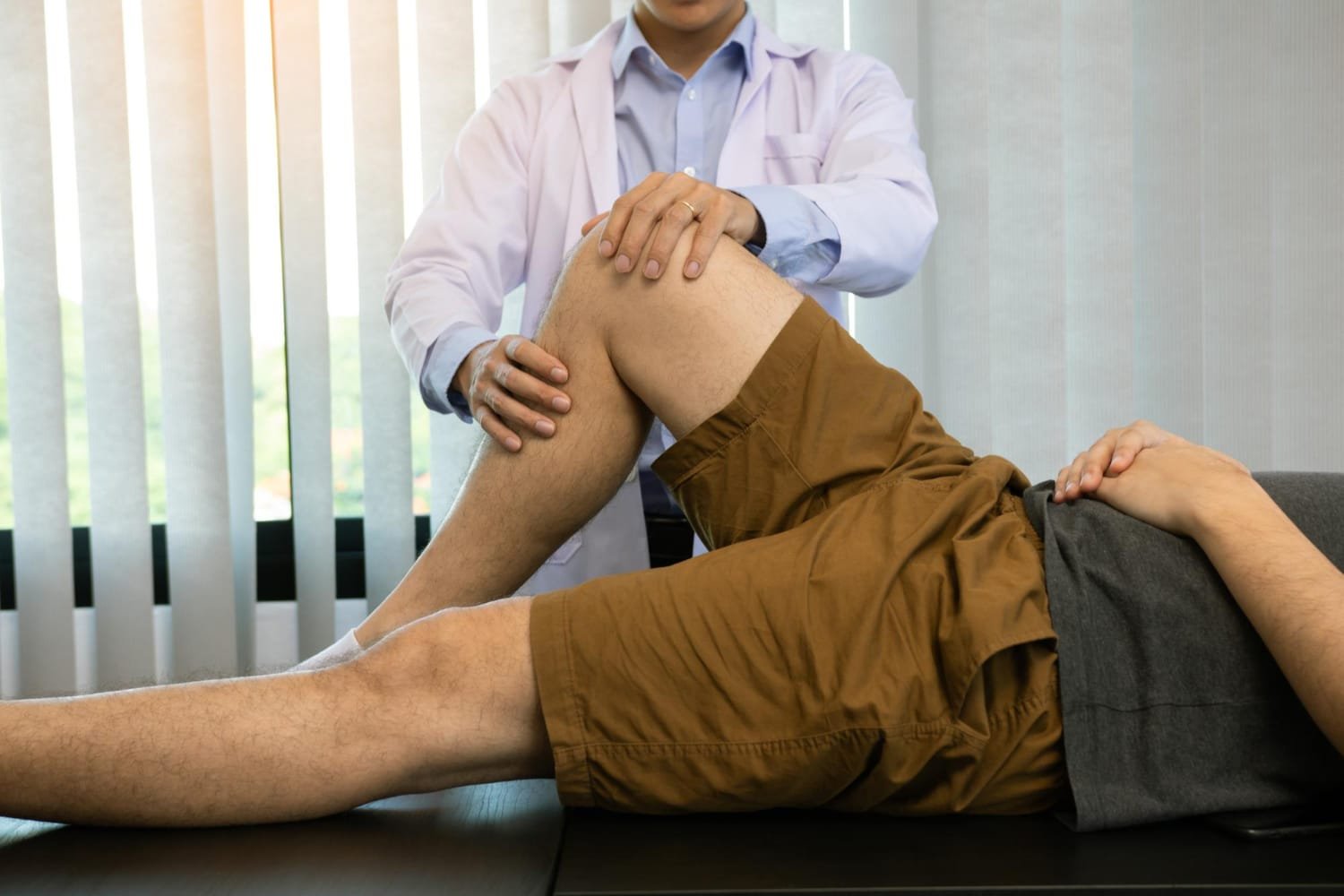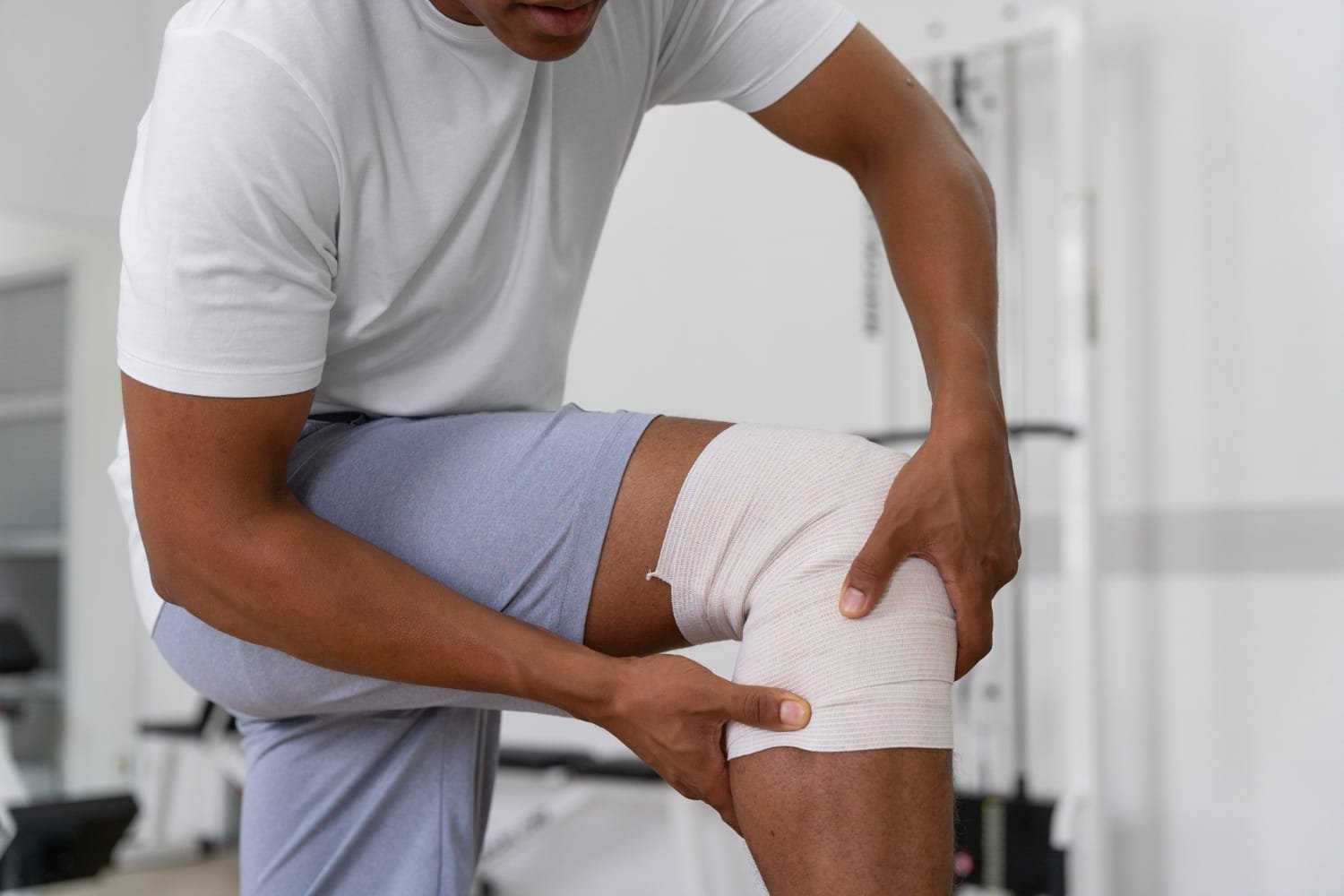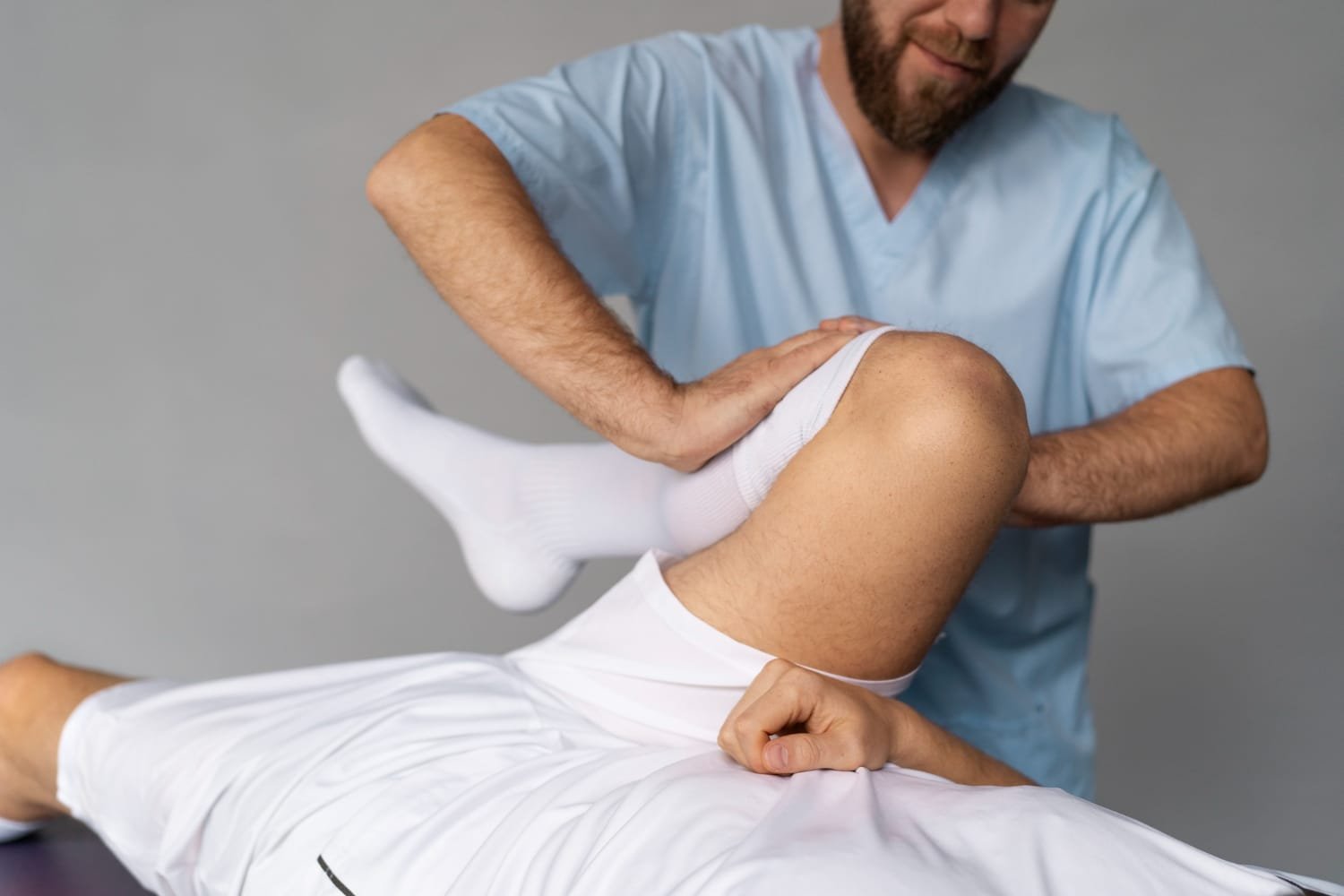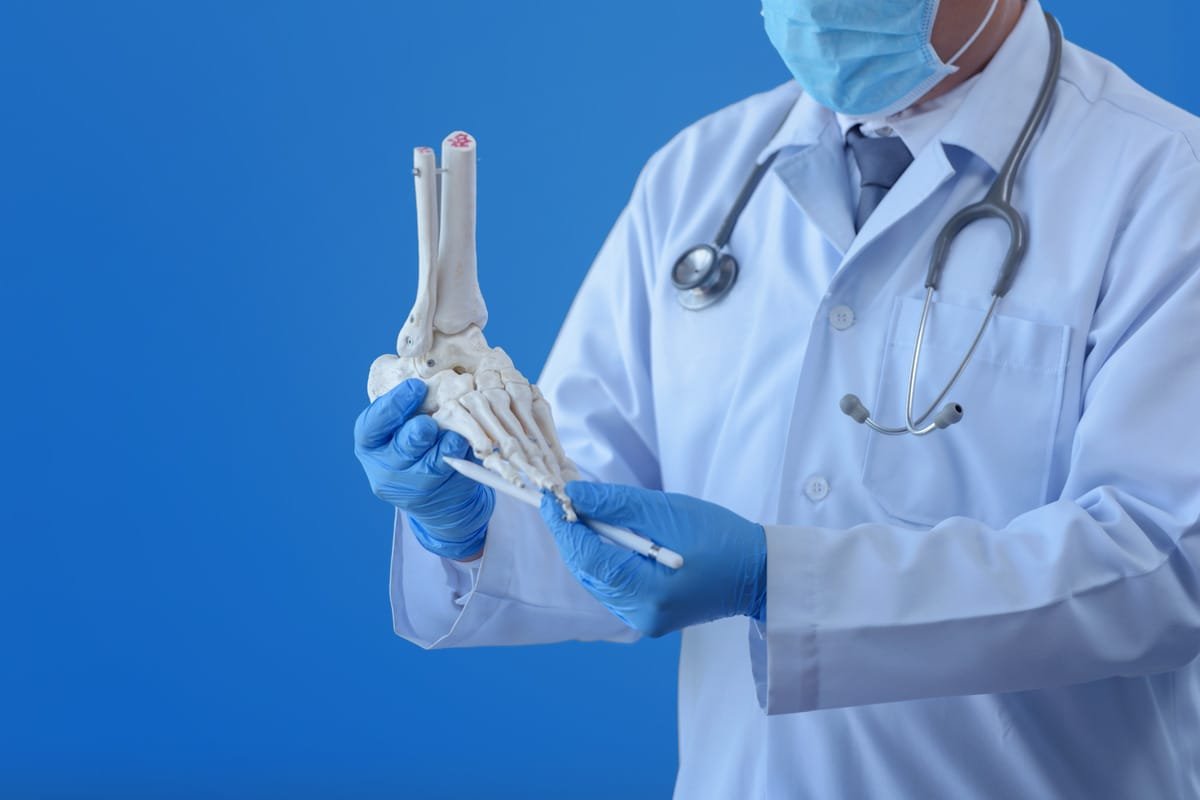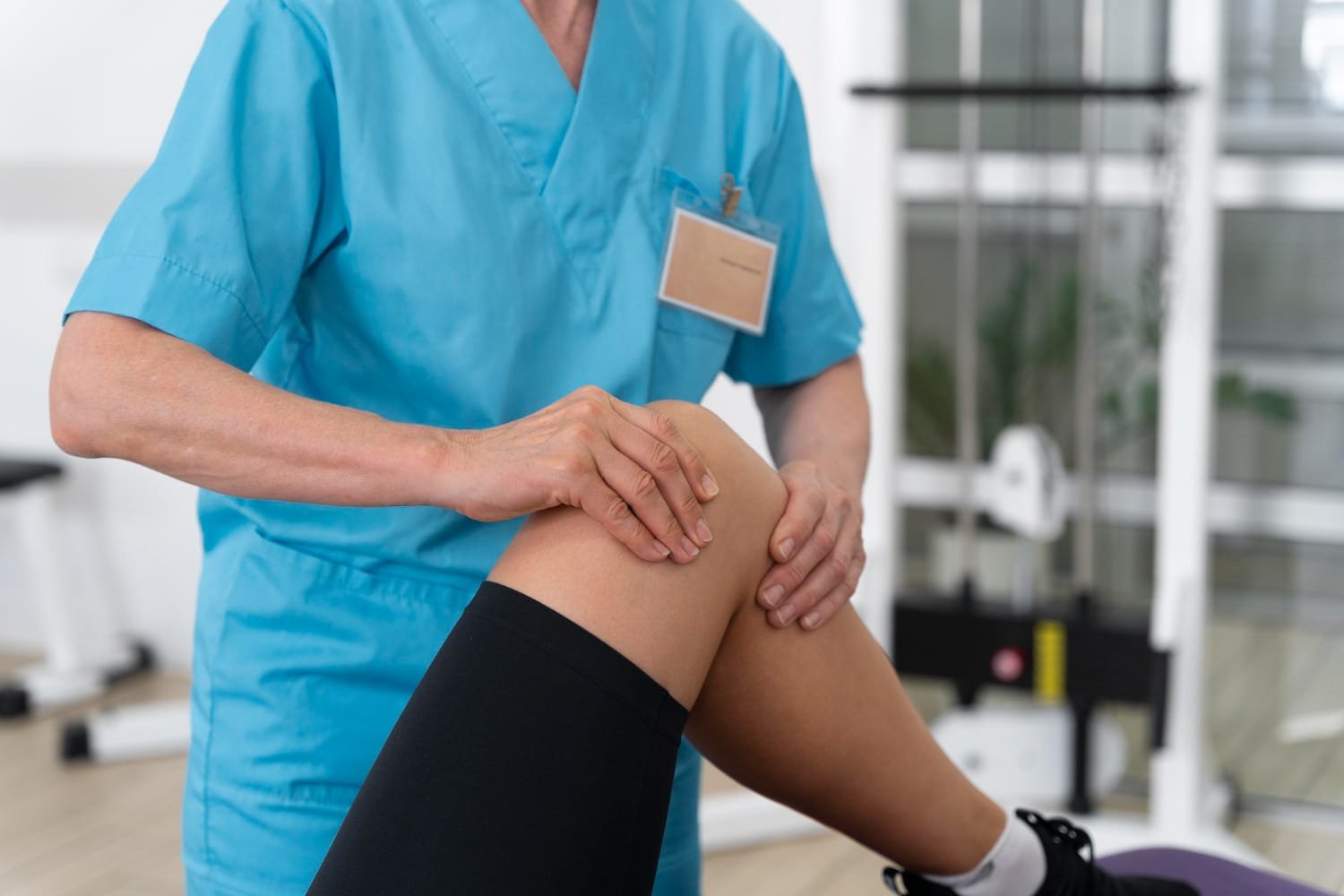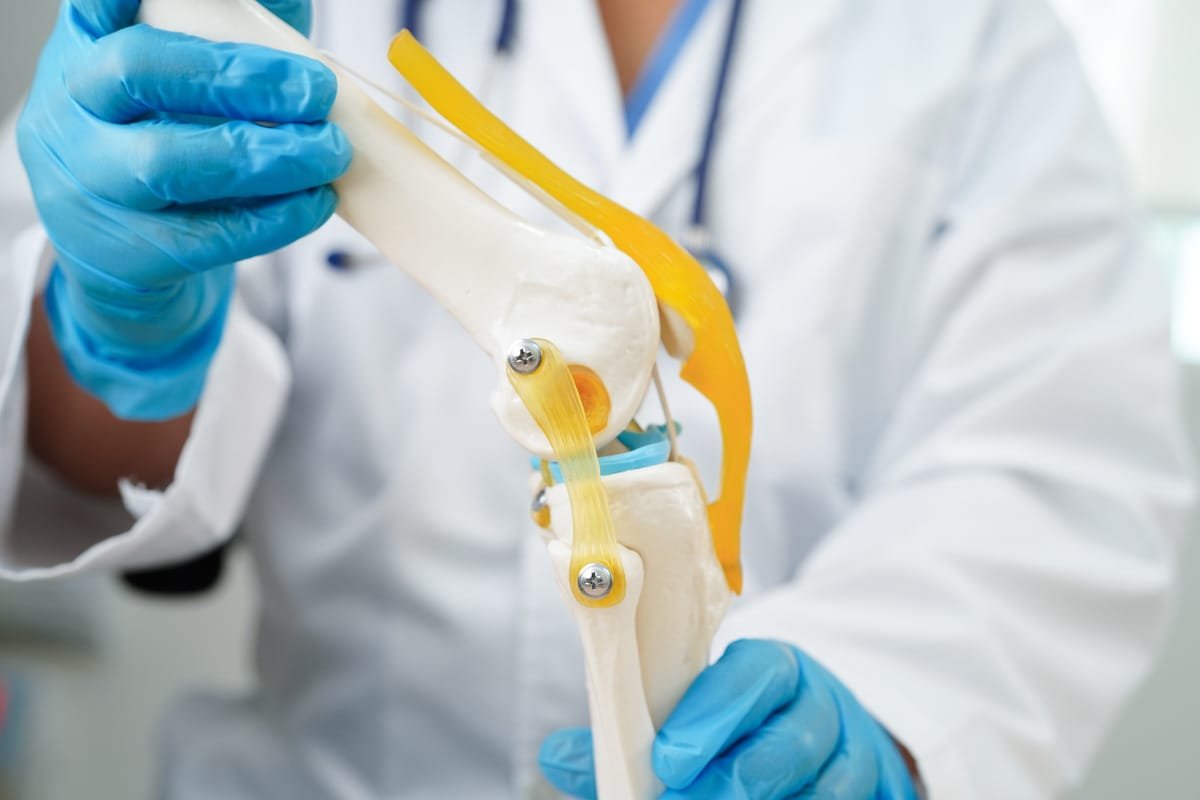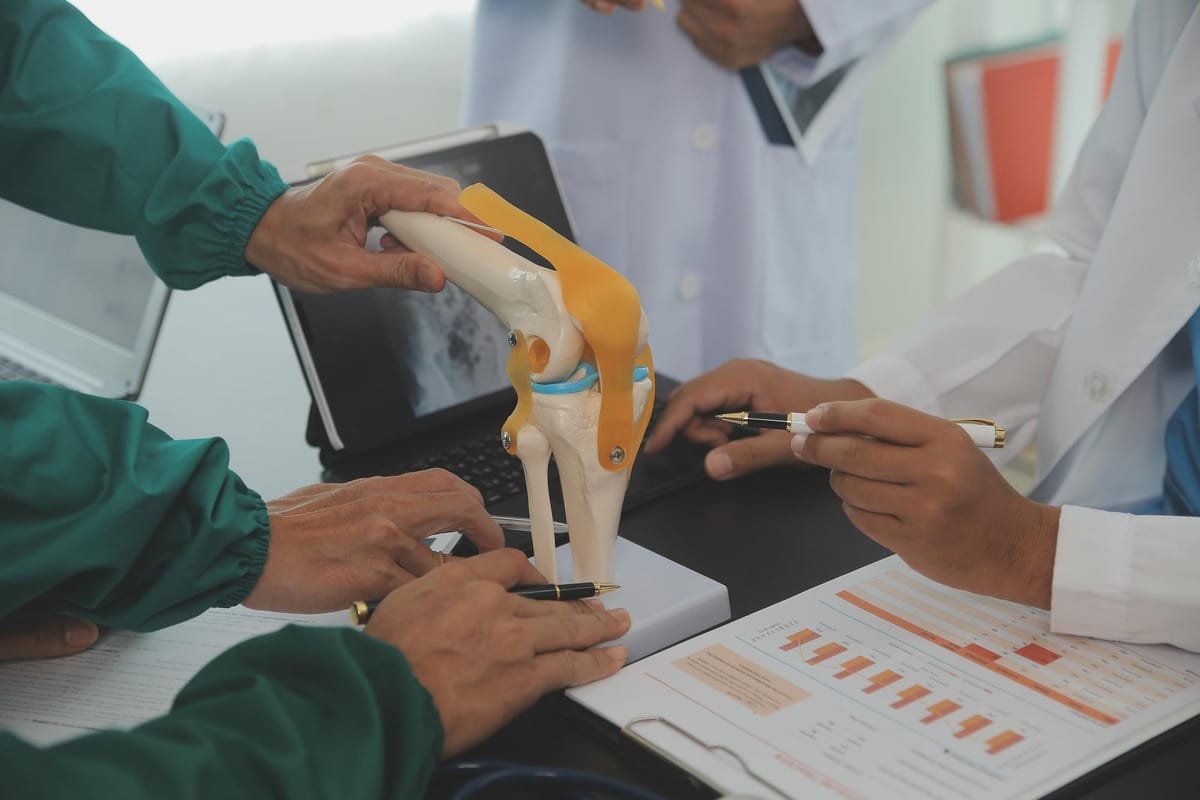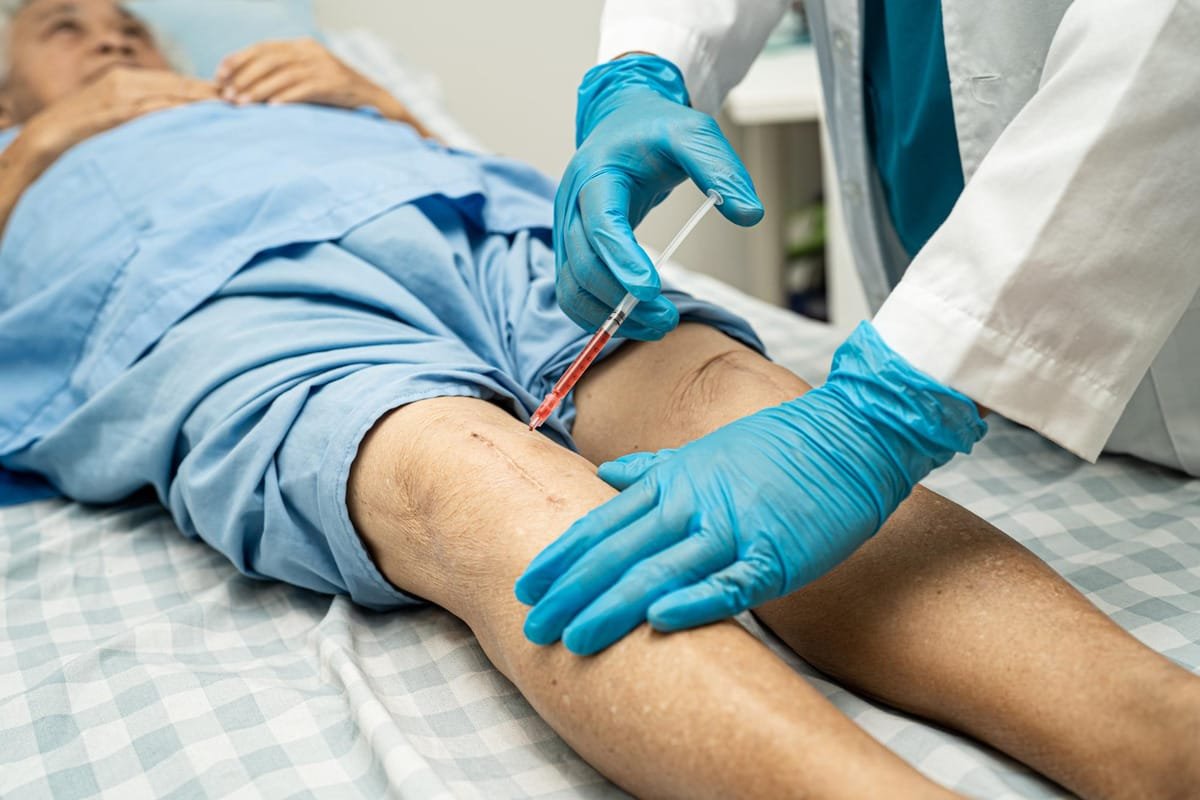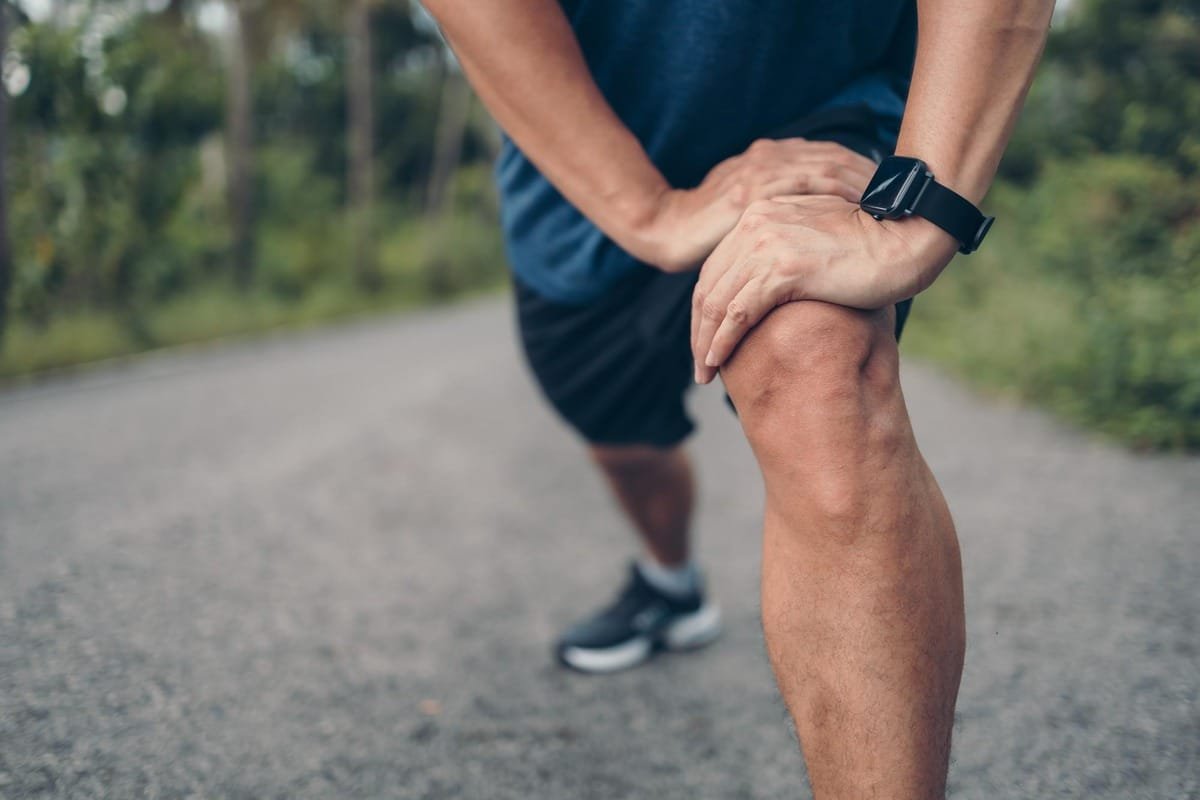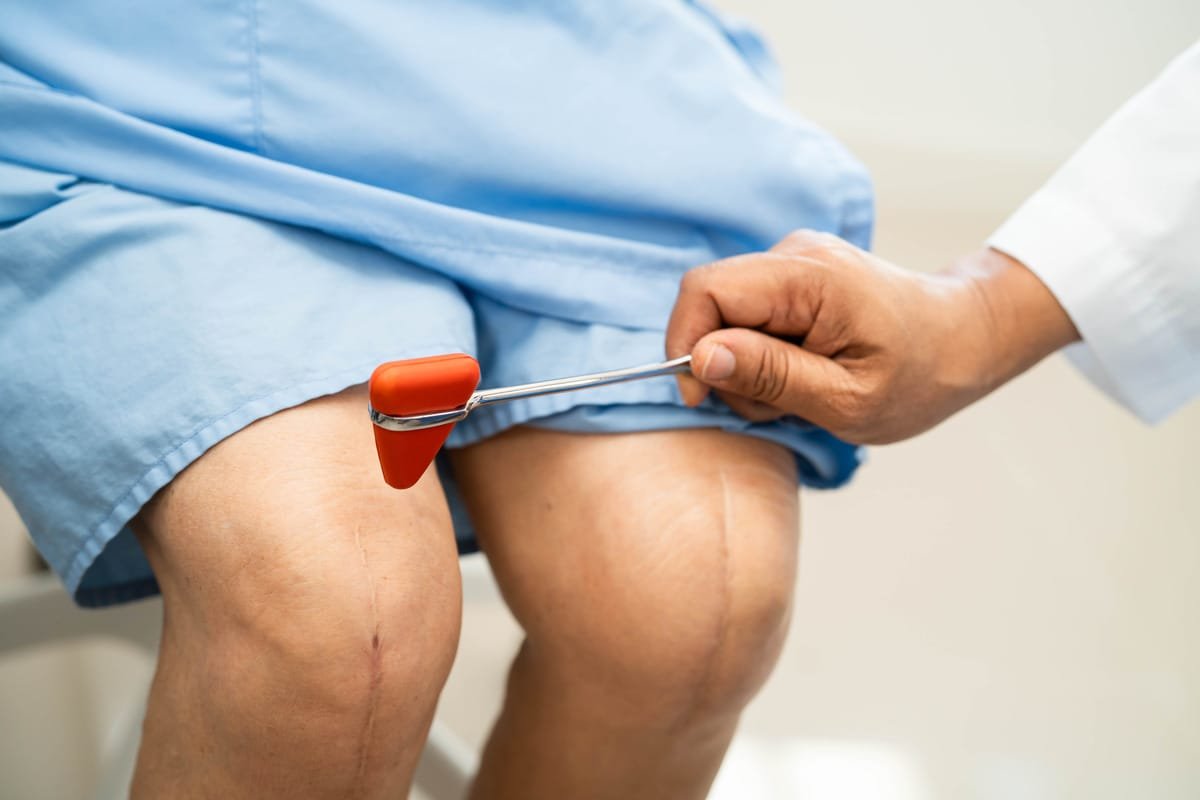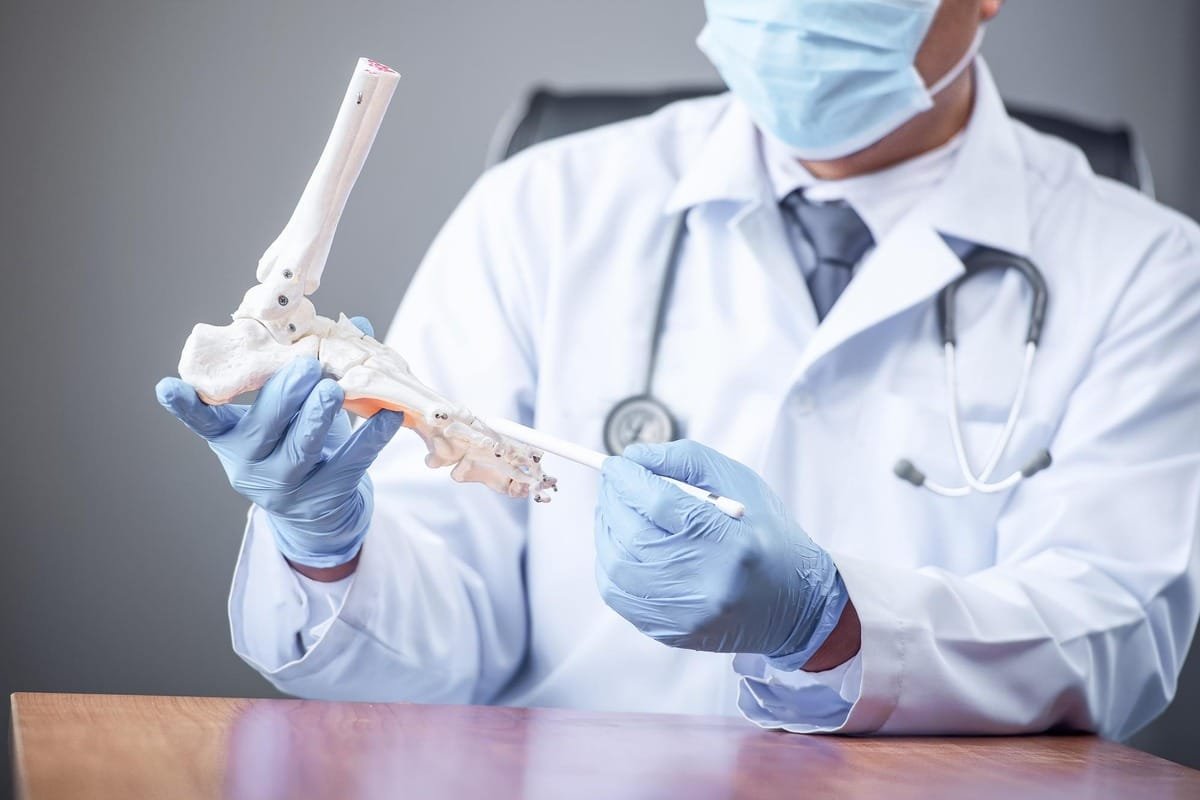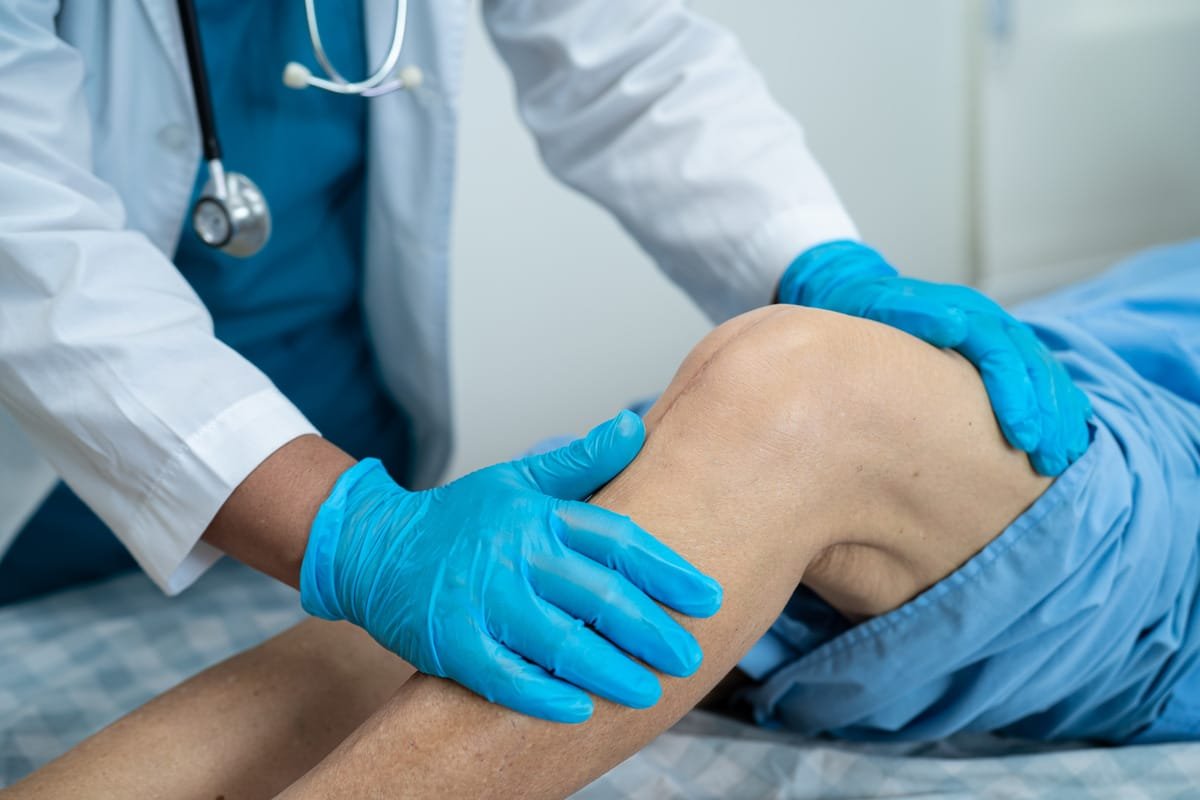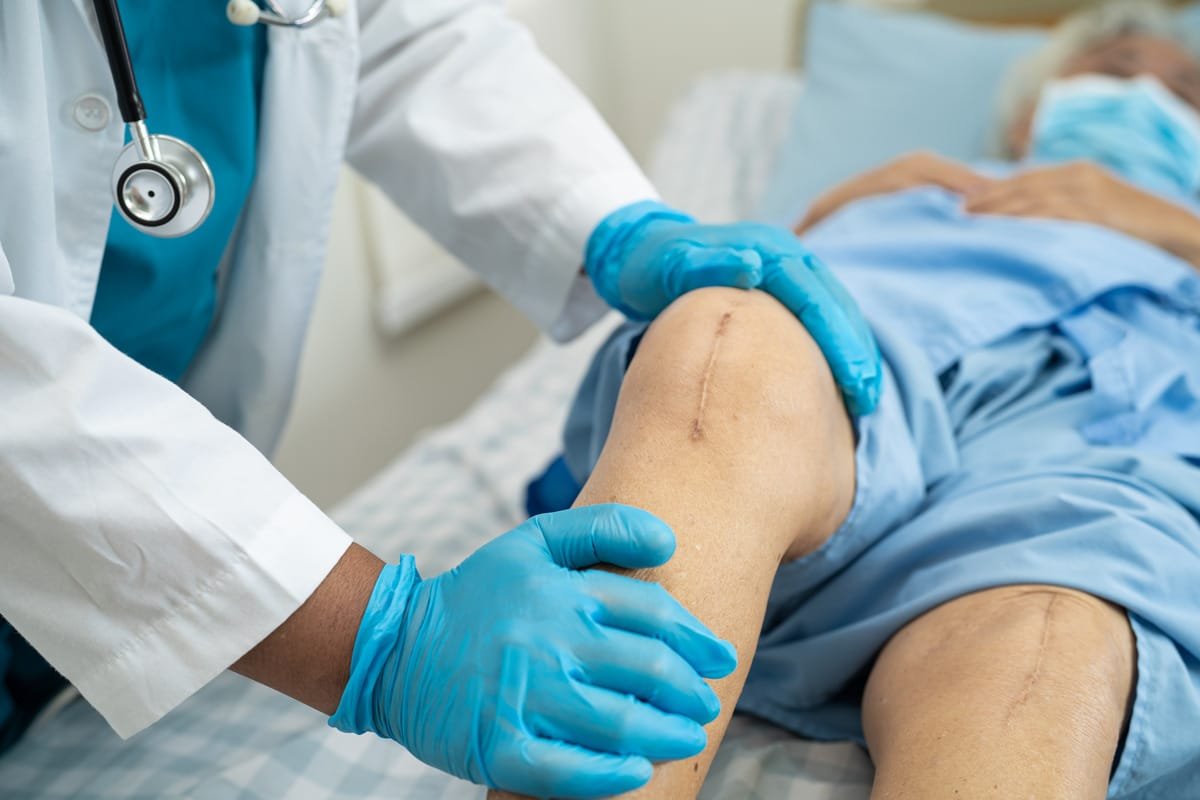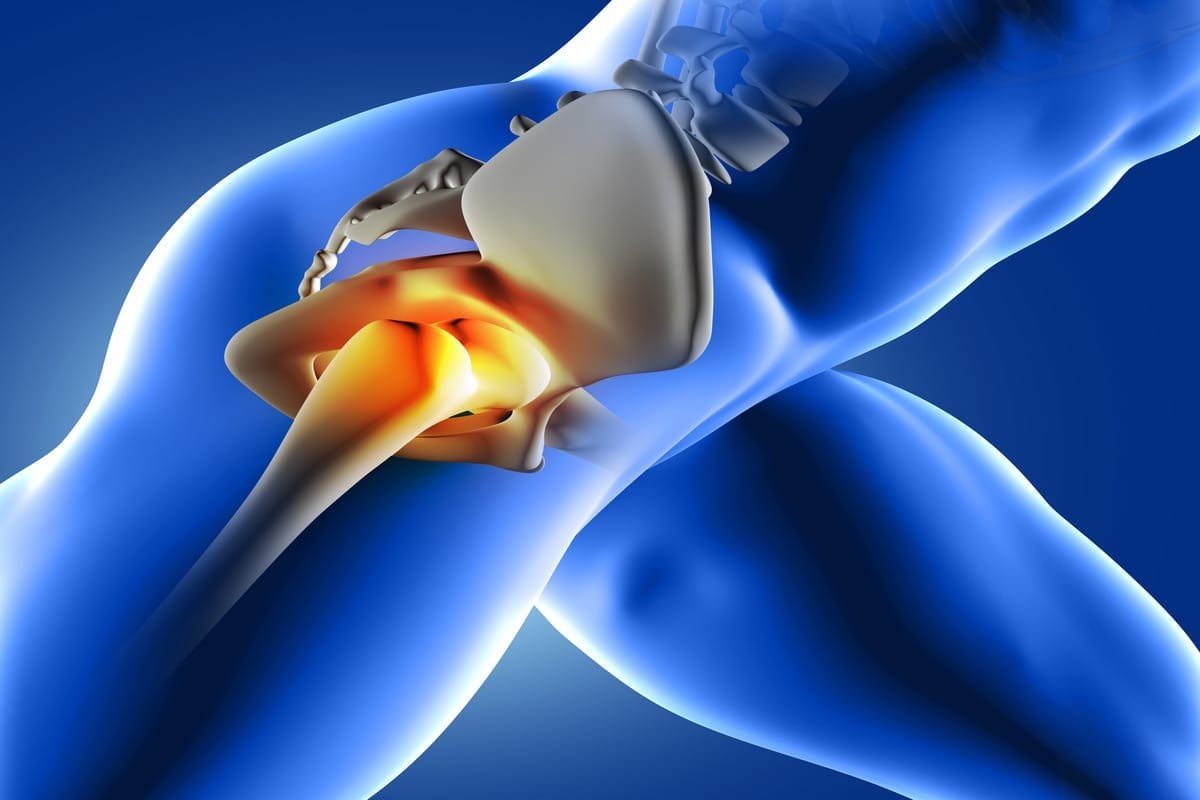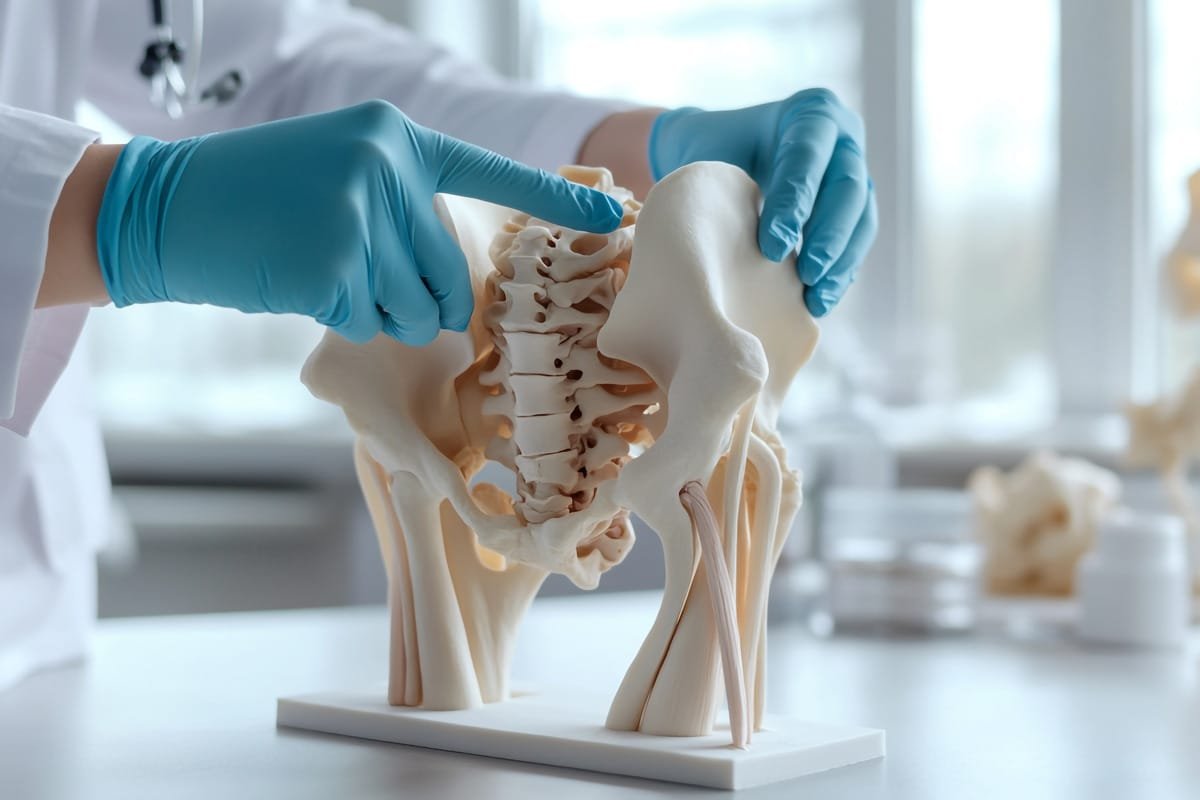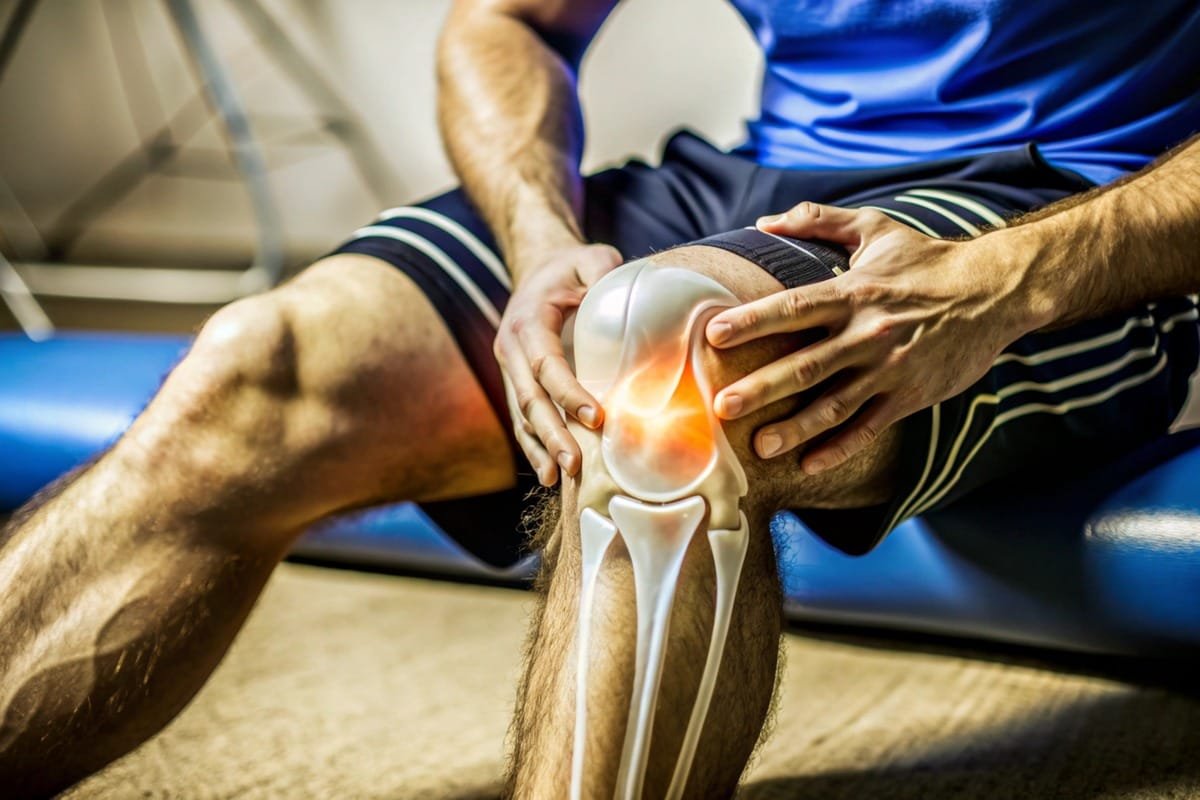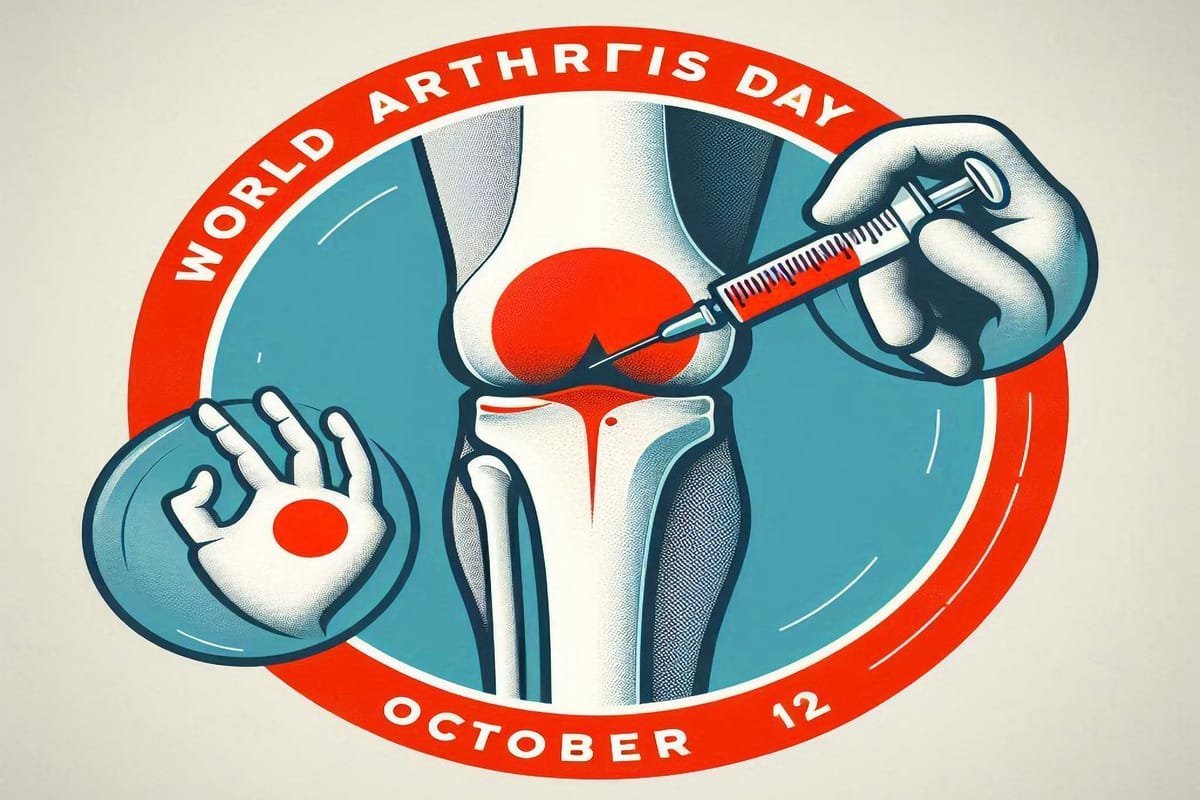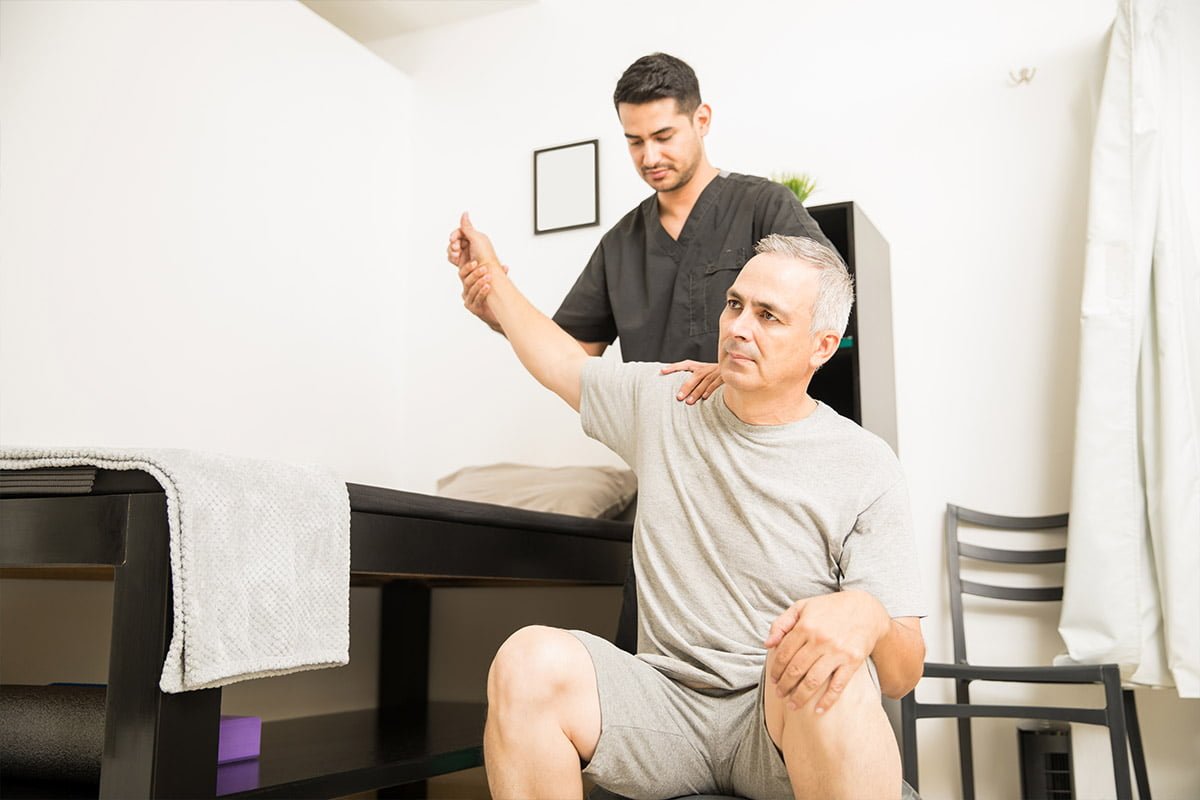
How to Prevent Knee Pain with Orthopedic Expert Tips
April 29, 2025Knee pain is one of the most common musculoskeletal complaints affecting people of all age groups. Whether caused by aging, overuse, obesity, or injury, knee discomfort can severely impact daily movement and quality of life. The good news is—most knee pain can be prevented by following simple yet effective orthopedic advice.
In this article, we’ll explore the top orthopedic expert tips for preventing knee pain, and explain why consulting Dr. Deepak Mishra, a leading orthopedic specialist in Faridabad, can make all the difference in maintaining long-term joint health.
Understanding the Knee Joint: Why It’s Prone to Pain
The knee is the largest and most complex joint in the body. It connects the thigh bone (femur) to the shin bone (tibia) and includes structures like cartilage, ligaments, tendons, and muscles. Given its central role in walking, running, climbing, and bearing body weight, the knee is vulnerable to wear-and-tear, inflammation, and injury.
Common causes of knee pain include:
- Osteoarthritis and rheumatoid arthritis
- Ligament injuries (ACL, MCL)
- Meniscus tears
- Patellar tendonitis
- Overuse injuries
- Muscle imbalances
Fortunately, preventive care and orthopedic guidance can go a long way in keeping your knees healthy.
Orthopedic-Approved Tips to Prevent Knee Pain
1. Maintain a Healthy Weight
Extra weight adds significant stress on the knees. Losing even a few kilograms can:
- Reduce joint pressure
- Minimize cartilage damage
- Delay the onset of arthritis
Dr. Deepak Mishra emphasizes weight control as a primary preventive strategy, especially for middle-aged and elderly patients prone to degenerative joint conditions.
2. Strengthen Your Leg Muscles
Strong muscles around the knee—especially the quadriceps and hamstrings—act as shock absorbers and stabilize the joint.
Incorporate:
- Leg presses
- Hamstring curls
- Step-ups
- Resistance band workouts
Consult an orthopedic specialist or physiotherapist before starting any regimen to ensure exercises are suitable for your condition.
3. Stretch Before and After Exercise
Flexibility reduces the risk of strain and injury. Stretch the:
- Quadriceps
- Hamstrings
- Calves
- IT band
Avoid bouncing during stretches. Hold each stretch for at least 20–30 seconds in a controlled manner.
4. Avoid High-Impact Activities
High-impact sports like running on hard surfaces, jumping, or deep squats can aggravate the knees over time.
Safer alternatives include:
- Swimming
- Cycling
- Brisk walking
- Elliptical training
If you must run, choose soft tracks or grass and wear appropriate footwear.
5. Use Proper Footwear
The right shoes provide cushioning, support, and correct body alignment. Avoid:
- High heels
- Worn-out soles
- Unsupportive flats
Use orthotic inserts if recommended by your orthopedic doctor.
6. Practice Good Posture and Alignment
Whether you’re standing, walking, or exercising, correct posture reduces knee strain. Avoid:
- Locked knees when standing
- Crossing legs for long periods
- Poor sitting habits
Dr. Deepak Mishra advises posture correction exercises and proper ergonomic habits to reduce unnecessary knee pressure.
7. Stay Active – But Know Your Limits
A sedentary lifestyle weakens muscles and joints. Aim for at least 30 minutes of low-impact activity most days of the week, but avoid pushing through sharp or persistent knee pain.
Listen to your body. Overuse is a common cause of chronic knee issues.
8. Don’t Ignore Minor Discomfort
Early signs of knee problems—like occasional stiffness, swelling, or mild pain—should not be ignored. Early intervention can prevent long-term damage.
Schedule a consultation with a trusted orthopedic specialist like Dr. Deepak Mishra if:
- Pain lasts more than a few days
- Swelling or redness occurs
- Joint movement becomes limited
Why Choose Dr. Deepak Mishra for Knee Pain Prevention and Care?
Dr. Deepak Mishra is a highly experienced orthopedic surgeon known for his patient-centric, conservative, and evidence-based approach to musculoskeletal health. Recognized as the best orthopedic doctor in Faridabad, he specializes in diagnosing and treating knee pain, arthritis, ligament injuries, and joint degeneration.
His strengths include:
- Precision diagnosis using advanced imaging
- Individualized treatment plans
- Expertise in both non-surgical and surgical options
- Emphasis on long-term joint preservation and mobility
- Outstanding patient outcomes and satisfaction
Common Knee Conditions Treated by Dr. Deepak Mishra:
- Osteoarthritis of the knee
- ACL and meniscus injuries
- Patellar dislocations
- Tendinitis and bursitis
- Post-traumatic joint complications
Dr. Mishra also provides post-operative care and rehabilitation guidance, ensuring every patient recovers safely and fully.
Book Your Consultation with Dr. Deepak Mishra
If you’re experiencing knee discomfort or want to prevent future joint issues, trust Dr. Deepak Mishra for expert care and lifelong orthopedic health.
Call to Book Appointment: +91 8287334003
Location: Asian Institute of Medical Sciences, Sector 21A, Faridabad
Website: https://drdeepakmishra.com/
Conclusion
Knee pain doesn’t have to be a part of your life. With early care, proper exercise, and expert guidance, it is possible to protect your knees and stay active at any age. If you’re in Faridabad and looking for personalized, high-quality orthopedic care, Dr. Deepak Mishra is your trusted partner in long-term joint health.
Recent Blogs
-
 Who Is Not Suitable for Knee Replacement Surgery?
Who Is Not Suitable for Knee Replacement Surgery?- 12, February 2026
-
 Best Meniscus Injury Surgeon in Faridabad
Best Meniscus Injury Surgeon in Faridabad- 9, February 2026
-
 How Obesity Affects Knee Health & When to Consider Knee Replacement
How Obesity Affects Knee Health & When to Consider Knee Replacement- 6, February 2026
-
 Knee Pain After Sitting for Long Hours – What to Do
Knee Pain After Sitting for Long Hours – What to Do- 3, February 2026
-
 Most Common Sports Injuries and How to Prevent Them
Most Common Sports Injuries and How to Prevent Them- 26, January 2026
-
 Walking, Stairs & Daily Activities After Knee Replacement
Walking, Stairs & Daily Activities After Knee Replacement- 22, January 2026
-
 When Knee Pain Needs Medical Attention: Red Flags to Watch
When Knee Pain Needs Medical Attention: Red Flags to Watch- 19, January 2026
-
 Cartilage Damage in Sports: Early Signs Athletes Should Not Ignore
Cartilage Damage in Sports: Early Signs Athletes Should Not Ignore- 15, January 2026
-
 Can You Sit Cross-Legged After Knee Replacement?
Can You Sit Cross-Legged After Knee Replacement?- 13, January 2026
-
 Types of Knee Implants
Types of Knee Implants- 13, January 2026
-
 Special Tests for Knee Osteoarthritis
Special Tests for Knee Osteoarthritis- 7, January 2026
-
 Knee Operation Types: A Comprehensive Guide
Knee Operation Types: A Comprehensive Guide- 7, January 2026
-
 Difference Between Knee Arthritis, Meniscus Tear, and Ligament Injury
Difference Between Knee Arthritis, Meniscus Tear, and Ligament Injury- 30, December 2025
-
 Knee Pain While Walking: When Should You Worry?
Knee Pain While Walking: When Should You Worry?- 30, December 2025
-
 What Happens If Knee Replacement Is Delayed Too Long?
What Happens If Knee Replacement Is Delayed Too Long?- 24, December 2025
-
 How Cartilage Loss Leads to Chronic Knee Pain
How Cartilage Loss Leads to Chronic Knee Pain- 24, December 2025
-
 ACL Tears in Athletes: Symptoms, Treatment Options & Recovery
ACL Tears in Athletes: Symptoms, Treatment Options & Recovery- 19, November 2025
-
 Sports Injuries That Often Lead to Knee Replacement
Sports Injuries That Often Lead to Knee Replacement- 19, November 2025
-
 Orthopedic Care for Elderly Patients — A Complete Guide
Orthopedic Care for Elderly Patients — A Complete Guide- 12, November 2025
-
 How Long Do Knee Implants Last? (10–20 Year Longevity Guide)
How Long Do Knee Implants Last? (10–20 Year Longevity Guide)- 12, November 2025
-
 Importance of Early Diagnosis in Bone and Joint Problems
Importance of Early Diagnosis in Bone and Joint Problems- 28, October 2025
-
 Best Treatment Options for Sports Injuries
Best Treatment Options for Sports Injuries- 28, October 2025
-
 The Difference Between ACL Tear, Sprain, and Rupture
The Difference Between ACL Tear, Sprain, and Rupture- 16, October 2025
-
 Post-ACL Surgery Do’s and Don’ts
Post-ACL Surgery Do’s and Don’ts- 16, October 2025
-
 Early Signs You Might Have an ACL Injury (and When to See a Doctor)
Early Signs You Might Have an ACL Injury (and When to See a Doctor)- 16, October 2025
-
 Does Insurance Cover Robotic Knee Replacement Surgery?
Does Insurance Cover Robotic Knee Replacement Surgery?- 6, October 2025
-
 When Can You Return to Sports After Robotic Knee Replacement?
When Can You Return to Sports After Robotic Knee Replacement?- 6, October 2025
-
 Impact of Obesity on Knee Replacement Surgery and Recovery
Impact of Obesity on Knee Replacement Surgery and Recovery- 30, September 2025
-
 Early vs. Delayed Knee Replacement: Which Is Better?
Early vs. Delayed Knee Replacement: Which Is Better?- 30, September 2025
-
 How Durable Are Knee Implants? A Complete Guide
How Durable Are Knee Implants? A Complete Guide- 24, September 2025
-
 Can You Play Sports After Knee Replacement Surgery?
Can You Play Sports After Knee Replacement Surgery?- 24, September 2025
-
 Key Benefits of Revision Hip Replacement You Should Know
Key Benefits of Revision Hip Replacement You Should Know- 15, September 2025
-
 Revision Hip Replacement vs. Primary Hip Replacement: Key Differences
Revision Hip Replacement vs. Primary Hip Replacement: Key Differences- 15, September 2025
-

-
 Total Knee Replacement Complications: What You Need to Know
Total Knee Replacement Complications: What You Need to Know- 5, September 2025
-
 Can You Play Sports After Hip Replacement Surgery?
Can You Play Sports After Hip Replacement Surgery?- 26, August 2025
-
 Preparing for Knee Replacement: Do’s and Don’ts Before Surgery
Preparing for Knee Replacement: Do’s and Don’ts Before Surgery- 26, August 2025
-

-
 What to Know About Knee Replacement Revision Surgery
What to Know About Knee Replacement Revision Surgery- 18, August 2025
-
 Cost of Hip Replacement in India – What Patients Should Know
Cost of Hip Replacement in India – What Patients Should Know- 11, August 2025
-

-
 Who Is the Best Orthopedic Doctor for Sports Injuries?
Who Is the Best Orthopedic Doctor for Sports Injuries?- 27, July 2025
-
 Success Rate of Robotic Knee Replacement in India
Success Rate of Robotic Knee Replacement in India- 27, July 2025
-
 Why Surgeons Are Switching to Robotic Knee Replacements
Why Surgeons Are Switching to Robotic Knee Replacements- 15, July 2025
-
 Do’s and Don’ts After Knee Replacement Surgery
Do’s and Don’ts After Knee Replacement Surgery- 15, July 2025
-
 Best Robotic Knee Replacement in India
Best Robotic Knee Replacement in India- 7, July 2025
-
 Affordable Robotic Knee Replacement in India
Affordable Robotic Knee Replacement in India- 7, July 2025
-

-

-

-

-

-

-

-
 Orthopedic Meaning, Definition, Types, and More
Orthopedic Meaning, Definition, Types, and More- 6, June 2025
-
 What Are the Most Common Orthopedic Surgeries?
What Are the Most Common Orthopedic Surgeries?- 24, May 2025
-
 What Does an Orthopedic Doctor Do?
What Does an Orthopedic Doctor Do?- 24, May 2025
-

-

-

-
 Best Orthopedic Doctor for Knee Pain in Faridabad
Best Orthopedic Doctor for Knee Pain in Faridabad- 12, May 2025
-
 How to Prevent Knee Pain with Orthopedic Expert Tips
How to Prevent Knee Pain with Orthopedic Expert Tips- 29, April 2025
-

-
 Best Orthopedic Treatment in Faridabad: What You Should Know
Best Orthopedic Treatment in Faridabad: What You Should Know- 29, April 2025
-

-

-
 Best Knee Replacement Surgeon in Mathura
Best Knee Replacement Surgeon in Mathura- 14, April 2025
-
 Best Knee Replacement Surgeon in Hodal
Best Knee Replacement Surgeon in Hodal- 14, April 2025
-
 Best Knee Replacement Surgeon in Palwal
Best Knee Replacement Surgeon in Palwal- 14, April 2025
-

-

-

-
 Benefits of Minimally Invasive Knee Surgery
Benefits of Minimally Invasive Knee Surgery- 24, March 2025
-
 Best knee Replacement Surgeon in India
Best knee Replacement Surgeon in India- 17, March 2025
-

-
 How to Recover Quickly After Knee Replacement Surgery
How to Recover Quickly After Knee Replacement Surgery- 10, March 2025
-

-

-

-
 Minimally Invasive Arthroplasty: Benefits and Recovery Advantages
Minimally Invasive Arthroplasty: Benefits and Recovery Advantages- 24, February 2025
-
 Common Mistakes to Avoid After Joint Replacement Surgery
Common Mistakes to Avoid After Joint Replacement Surgery- 24, February 2025
-
 Choosing the Right Hip Replacement Surgeon: A Comprehensive Guide
Choosing the Right Hip Replacement Surgeon: A Comprehensive Guide- 17, February 2025
-
 Restoring Mobility: The Role of Knee Replacement Doctors
Restoring Mobility: The Role of Knee Replacement Doctors- 17, February 2025
-
 Orthopedic Trauma Care for Athletes
Orthopedic Trauma Care for Athletes- 6, February 2025
-
 Best Doctor for ACL Tear Treatment
Best Doctor for ACL Tear Treatment- 6, February 2025
-
 Best Sports Medicine Doctor for Knee Injuries
Best Sports Medicine Doctor for Knee Injuries- 6, February 2025
-
 Orthopedic Surgeons: 7 Things You Need to Know
Orthopedic Surgeons: 7 Things You Need to Know- 27, January 2025
-
 Best Joint Replacement Surgeon in Greater Faridabad
Best Joint Replacement Surgeon in Greater Faridabad- 27, January 2025
-
 Best Knee Replacement Surgeon in Palwal
Best Knee Replacement Surgeon in Palwal- 20, January 2025
-
 Best Knee Replacement Surgeon in South Delhi
Best Knee Replacement Surgeon in South Delhi- 20, January 2025
-
 Signs You May Need a Knee Replacement: Insights from a Surgeon
Signs You May Need a Knee Replacement: Insights from a Surgeon- 13, January 2025
-
 Restoring Mobility: The Role of Knee Replacement Doctor
Restoring Mobility: The Role of Knee Replacement Doctor- 13, January 2025
-
 Robotic Knee Replacement Surgery in Delhi
Robotic Knee Replacement Surgery in Delhi- 30, December 2024
-
 Robotic Orthopedic Surgery: Revolutionizing Joint Replacement and Repair
Robotic Orthopedic Surgery: Revolutionizing Joint Replacement and Repair- 30, December 2024
-
 Robotic Knee Replacement vs. Traditional Surgery: A Comparative Guide
Robotic Knee Replacement vs. Traditional Surgery: A Comparative Guide- 23, December 2024
-
 How to Make Joints Stronger: A Comprehensive Guide
How to Make Joints Stronger: A Comprehensive Guide- 23, December 2024
-
 Common Knee Conditions and How a Knee Surgeon Can Help
Common Knee Conditions and How a Knee Surgeon Can Help- 16, December 2024
-

-

-
 Orthopedic Surgeons: 7 Things You Need to Know
Orthopedic Surgeons: 7 Things You Need to Know- 6, December 2024
-
 Top 5 Mistakes After Knee Replacement
Top 5 Mistakes After Knee Replacement- 25, November 2024
-
 Advantages and Disadvantages of Robotic Knee Replacement
Advantages and Disadvantages of Robotic Knee Replacement- 25, November 2024
-
 When to See an Orthopedic Specialist: Recognizing Early Signs
When to See an Orthopedic Specialist: Recognizing Early Signs- 15, November 2024
-
 Benefits of Robotic-Assisted Knee Replacement Surgery
Benefits of Robotic-Assisted Knee Replacement Surgery- 15, November 2024
-
 Knee Replacement Surgery Cost
Knee Replacement Surgery Cost- 8, November 2024
-
 Best Robotic Knee Replacement Surgeon in Faridabad
Best Robotic Knee Replacement Surgeon in Faridabad- 8, November 2024
-

-
 Knee Replacement Surgery: Types, Benefits, and Recovery Timeline
Knee Replacement Surgery: Types, Benefits, and Recovery Timeline- 28, October 2024
-
 What is Osteoporosis? Symptoms, Causes, and Prevention
What is Osteoporosis? Symptoms, Causes, and Prevention- 21, October 2024
-
 Signs It’s Time for a Knee Replacement: When to Consult a Surgeon
Signs It’s Time for a Knee Replacement: When to Consult a Surgeon- 18, October 2024
-
 Understanding Different Types of Arthritis: Symptoms and Causes
Understanding Different Types of Arthritis: Symptoms and Causes- 11, October 2024
-
 Taking Care After Knee Replacement Surgery
Taking Care After Knee Replacement Surgery- 15, December 2022
-
 Amazing Ways to Get Relief from Arthritis Pain Naturally
Amazing Ways to Get Relief from Arthritis Pain Naturally- 2, December 2022
-

-
 How Does Fat Affect Arthritis?
How Does Fat Affect Arthritis?- 4, November 2022

